U niversity of Richmond Bulletin

UBRARV
UNIVERSITY OF RICHMOND VIRGINIA
School of
BusinessAdministration
CA TALOGUE NUMBER FOR 1950
With Announcements for Session 1950-1951


UBRARV
UNIVERSITY OF RICHMOND VIRGINIA
School of
BusinessAdministration
CA TALOGUE NUMBER FOR 1950
With Announcements for Session 1950-1951
VOLUME Lil April 30, 1950

NUMBER 5
Entered as Second Class Matter at the Post Office at the University of Rich· mond, Virginia, under the Act of Congress of August 24, 1912.
Published by the University of Richmond seven times a year: once in March, four times in April, once in August, and once in December.
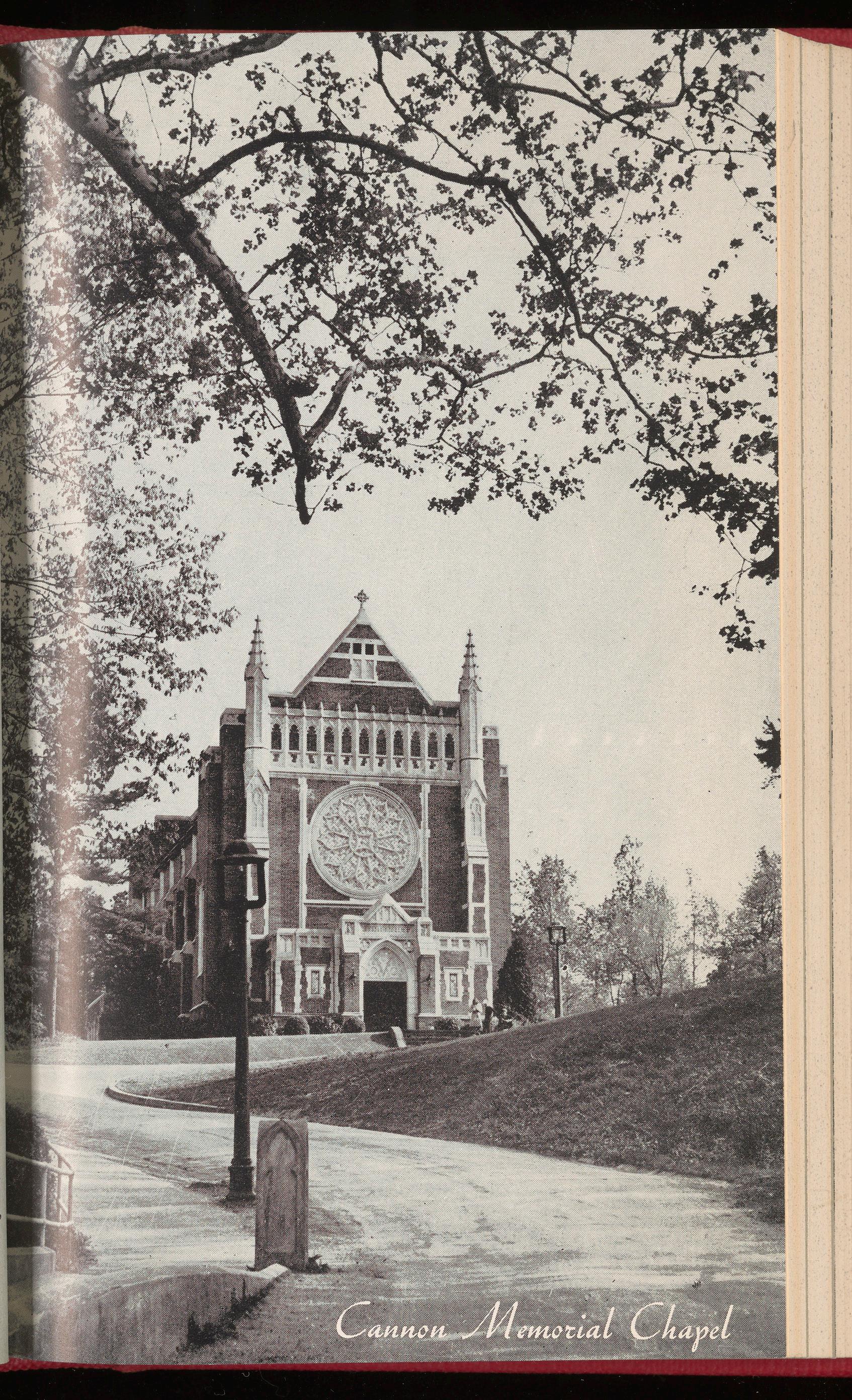
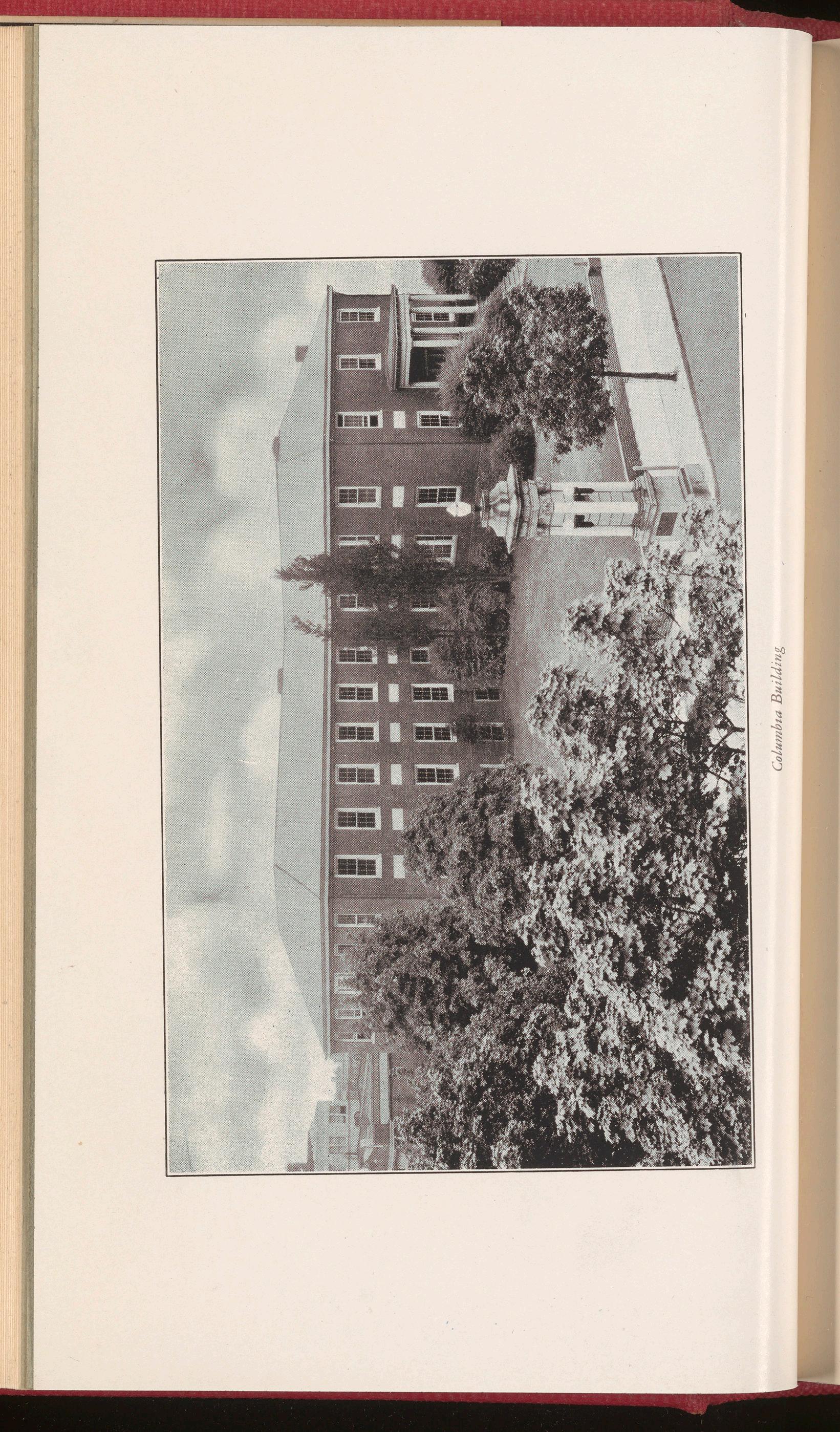
1950 WITH ANNOUNCEMENTS FOR 19 5 0-19 51

Day Classes-University of Richmond Campus Phone 84-0604
Evening Classes-Columbia Building, Grace and Lombardy Streets Phone 6-9485
FOR INFORMATION, ADDRESS
F. BYERS MILLER, Dean
School of Business Administration
University of Richmond, Virginia

RAYMOND B PINCHBECK, Dean UNIVERSITY OF RICHMOND, VIRGINIA
THE T. C. WILLIAMS SCHOOL OF LAW
WILLIAM T. MusE, Dean 601 NORTH LOMBARDY STREET RICHMOND, VIRGINIA
MARGUERITE ROBERTS, Dean UNIVERSITY OF RICHMOND, VIRGI N IA
SUMMER SCHOOL
EDWARD F OvERTON, Dean UNIVERSITY OF RICHMOND, VIR G INIA
GRADUATE SCHOOL
BENJAMIN C. HOLTZCLAW, Dean UNIVERSITY OF RICHMOND, VIRGINIA
SCHOOL OF BUSINESS ADMINISTRATION
F . BYERS MILLER, Dean UNIVERSITY OF RICHMOND, VIRGINIA
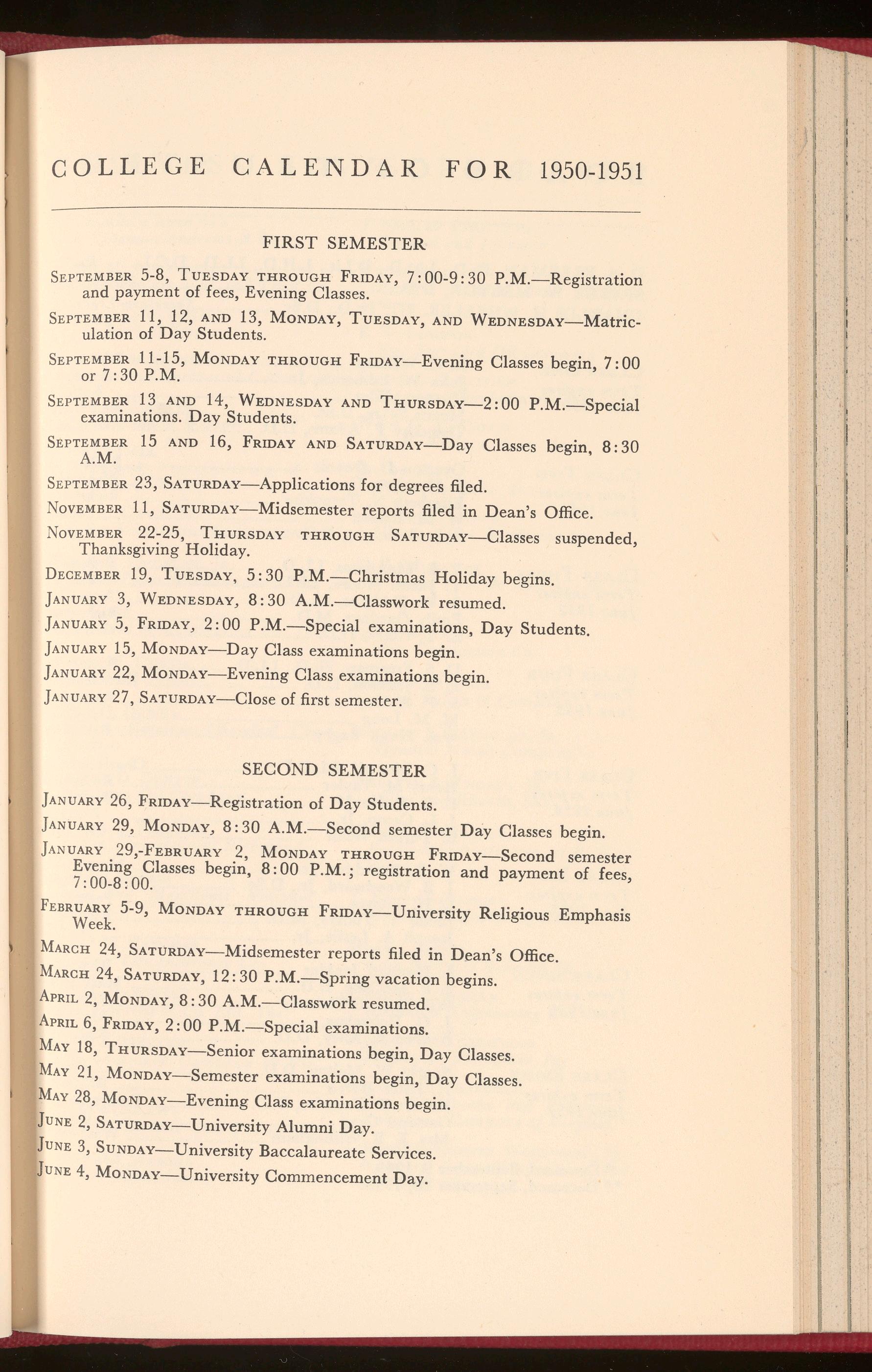
SEPTEMBER5-8, TUESDAY THROUGH FRIDAY,7: 00-9: 30 P.M.-Registration an d payment of fees, Evening Classes.
SEPTEMBER11, 12, AND 13, MONDAY,TUESDAY, AND WEDNESDAY-Matric- ulation of Day Students .
SEPTEMBER11-15, MoNDAY THROUGHFRIDAY-Evening Classes begin, 7:00 or 7:30 P M.
SEPTEMBER13 AND 14, WEDNESDAYAND THURSDAY-2:00 P.M.-Special examinations. Day Students.
SEPTEMBER15 AND 16, FRIDAY AND SATURDAY-Day Classes begin, 8: 30 A.M.
SEPTEMBER23, SATURDAY-Applications for degrees filed.
NOVEMBER11, SATURDAY-Midsemester reports filed in Dean's Office.
NovEMBER 22-25, THURSDAY THROUGH SATURDAY-Classes suspended, Thanksgiving Holiday.
DECEMBER19, TUESDAY, 5: 30 P.M.-Christmas Holiday begins.
JANUARY3, WEDNESDAY,8: 30 A.M.-Classwork resumed.
JANUARY5, FRIDAY, 2: 00 P.M.-Special examinations, Day Students.
JANUARY15, MONDAY-Day Class examinations begin.
JANUARY22, MONDAY-Evening Class examinations begin.
JANUARY27, SATURDAY-Close of first semester.
JANUARY26, FRIDAY-Registration of Day Students.
JANUARY29, MoNDAY, 8: 30 A.M.-Second semester Day Classes begin.
JANUARY29,-FEBRUARY 2, MONDAY THROUGH FRIDAY-Second semester Evening Classes begin, 8: 00 P.M.; registration and payment of fees, 7:00-8:00.
FEBRUARY5-9, MONDAY THROUGH FRIDAY-University Religious Emphasis Week.
MARCH24, SATURDAY-Midsemester reports filed in Dean's Office.
MARCH24, SATURDAY,12:30 P M -Spring vacation begins.
APRIL2, MONDAY,8: 30 A.M.-Classwork resumed.
APRIL6, FRIDAY,2: 00 P M.-Special examinations.
MAY18, THURSDAY-Senior examinations begin, Day Classes.
MAY21, MONDAY-Semester examinations begin, Day Classes.
MAY28, MONDAY-Evening Class examinations begin.
JUNE2, SATURDAY-University Alumni Day.
JUNE 3, SUNDAY-University Baccalaureate Services.
JUNE4, MONDAY-University Commencement Day.
D . S. FREEMAN, Ph.D., Litt.D., D.Lit., L.H.D ., LL.D., D C.L Rector
SPARKS W. MEL TON, D.D ......................................................... Vice-Rector
CHARLES H. WHEELER, III, Ph.D., D .S c .......... Secretary-Treasurer
CLASS ONE Term expires June 1950
CLASS Two Term expires June 1951
CLASS THREE Term expires June 1952
CLASS FouR Term expires June 1953
CLASS FrvE Term expires June 1954
CLASS Srx Term expires June 1955
CLASS SEVEN Term expires June 1956
CLASS EIGHT Term expires June 1957
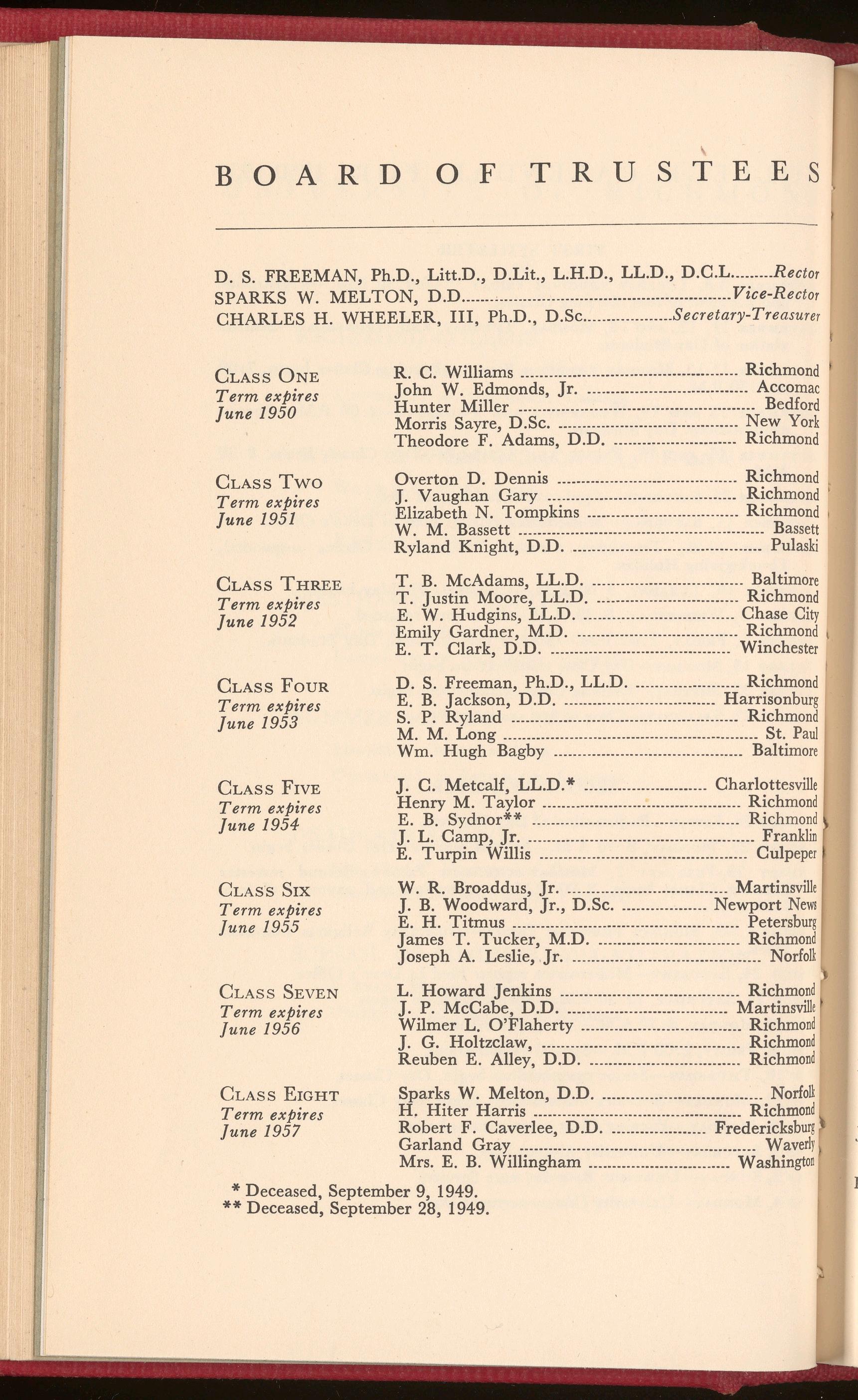
R. C. Williams .............................................. Richmond
John W. Edmonds, Jr. ..................................Accomac
Hunter Miller .................................................. Bedford
Morris Sayre, D.Sc ........ New York
Theodore F. Adams, D.D ........................... Richmond
Overton D. Dennis ...................................... Richmond
J. Vaughan Gary ........................................ Richmond
Elizabeth N Tompkins . Richmond 1
W. M. Bassett ....................... ........... Bassett
Ryland Knight, D.D Pulaski
T. B. McAdams, LL.D ... .......... .......... .. Baltimore
T. Justin Moore, LL D Richmond
E. W Hudgins, LL.D Chase City
Emily Gardner, M.D . .............. Richmond 1
E. T. Clark, D.D .. ..... Winchester
D. S. Freeman, Ph.D., LL D .... Richmond
E. B. Jackson, D.D Harrisonbur g
S. P. Ryland .......... ............. Richmond
M. M. Long ...................................................... St Paul
Wm. Hugh Bagby ................... ..................... Baltimore
J. C. Metcalf, LL.D.* Charlottesville
Henry M. Taylor .......................................... Richmond
E. B. Sydnor** ............................................ Richmond
J. L. Camp, Jr Franklin E. Turpin Willis ... Culpeper
W. R. Broaddus, Jr ................................... Martinsville
J. B. Woodward, Jr., D .Sc ...... ....... Newport News
E. H. Titmus ........................... Petersburg
James T. Tucker, M.D ............................... Richmond
Joseph A. Leslie, Jr ......................................... Norfol l
L. Howard Jenkins ...................................... Richmond
J. P. McCabe, D .D ...... ........ ............. ........ MartinsviUe
Wilmer L. O'Flaherty ..... .......... .................. . Richmond
J . G. Holtzclaw, Richmond Reuben E . Alley, D.D ...... Richmond
~a:.s W. Me!ton, D .D .................................... Norfoll rter Harns ........... ............ . Richmond
Robert F. Caverlee, D.D ........ Fredericksburg
Garland Gray ........ ....... .......... ... ....... Waverly
Mrs. E. B Willingham ............. .......... ....... Washington
* Deceased, September 9, 1949.
** Deceased, September 28, 1949.
T, COLEMAN ANDREWS T. Coleman Andrews & Co.
HARRY H. AUGUSTINE State-Planters Bank and Trust Co.
THOMAS C. BousHALL The Bank of Virginia
J MALCOLM BRIDGES · Richmond Chamber of Commerce
FRANK s. CALKINS Leach, Calkins & Scott
NORMAN CALL Richmond, Fredericksburg & Potomac R.R. Co.
JAMES L. CAMP, JR. Camp Manufacturing Company
HENRY G. CHESLEY, JR. Wilson Paper Box Company, Inc
B. 0. CONE Crawford Manufacturing Co., Inc .
WARREN F. CURTIS Boswell & Curtis
IRVING D. DAWES Virginia-Caro lina Chemical Corporation
OVERTON D. DENNIS Dominion Oil Company
DOUGLAS S FREEMAN Rector, University of Richmond
H. HITER HARRIS First and Merchants National Bank
ROBERT V. HATCHER Atlantic Life Insurance Co.
WIRT H. HATCHER Philip Morris & Co. Ltd., Inc.
ROBERT E. HENLEY L_if~ Insurance Company of Virginia
J. G. HOLTZCLAW Virginia Electric and Power Co.
L. HOWARD JENKINS
L. H. Jenkins, Inc.
J. AMBLER JOHNSTON Carneal and Johnston
HUGH LEACH
Federal Reserve Bank of Richmond
E.T. LEMMON Esso Standard Oil Company
FRANK G. LOUTHAN Virginia Manufactur ers Assn., Inc.
WADE G. McCARGO H. V. Baldwin & Co , Inc
IRVING MAY Thalhimer Bros., Inc .
CLAUDE D. MINOR Virginia Fire & Marine Ins. Co.
A. K. MISSIMER E. I. du Pont de Nemours & Co., Inc.
LEE PASCHALL Wise Contracting Co.
]AMES A. RENNIE A. M. Pullen & Company
RICHARD S. REYNOLDS, JR Reynolds Metals Company
WEBSTER S. RHOADS, ]R. Miller and Rhoads, Inc.
GEORGE C. ROBIN SON Retail Mer chants Assn. of Richmond
T. BRADY SAUNDERS Miller Manufacturing Co., Inc
MORRIS SAYRE Corn Products Refining Co.
THOMAS J. STARKE Richmond Engineering Co., Inc.
MORTON G. THALHIMER Morton G. Thalhimer, Inc
WILLIAM H. TRAPNELL The Chesapeake and Potomac Telephone Company of Virginia
J. BROCKENBROUGH WOODWARD, ]R. Newport News Shipbuilding and Dry Dock Co. I I I

FREDERICK WILLIAM BOATWRIGHT, M.A., LL.D., L.H.D. CHANCELLOR
GEORGE MATTHEWS MODLIN, Ph.D., LL.D. PRESIDENT
CHARLES H. WHEELER, III, Ph.D., D.Sc. TREASURER
F. BYERS MILLER, M.B.A. DEAN
EDWIN B. BROOKS, JR., M.S.B.A.
Ass'T. DEAN, EVENING CLASSES
CLARENCE J. GRAY, M.A . DEAN OF STUDENTS
HELEN A. MONSELL, M.A. REGISTRAR
CULLEN PITT, M.A., M.D. UNIVERSITY PHYSICIAN
LUCY T. THROCKMORTON ACTING LIBRARIAN
OTHELL HAND, Th.M. DIRECTOR OF RELIGIOUS ACTIVITIES
MERTON E. CARVER Professor of Psych ology
A.B., M.A., University of Rochester; Ph D., Harvard University.
RAYMOND B. PINCHBECK Prof essor of Business Administra tio11
B.S., M.S., Ph.D., University of Virginia,
HERMAN P. THOMAS
Professor of Economics, Chairman, D ep t. of Economics
B.S., Richmond College; M.A., Ph.D., University of Virginia; Harvard Gradu,1, School of Business Administration
ELWOOD FoRD
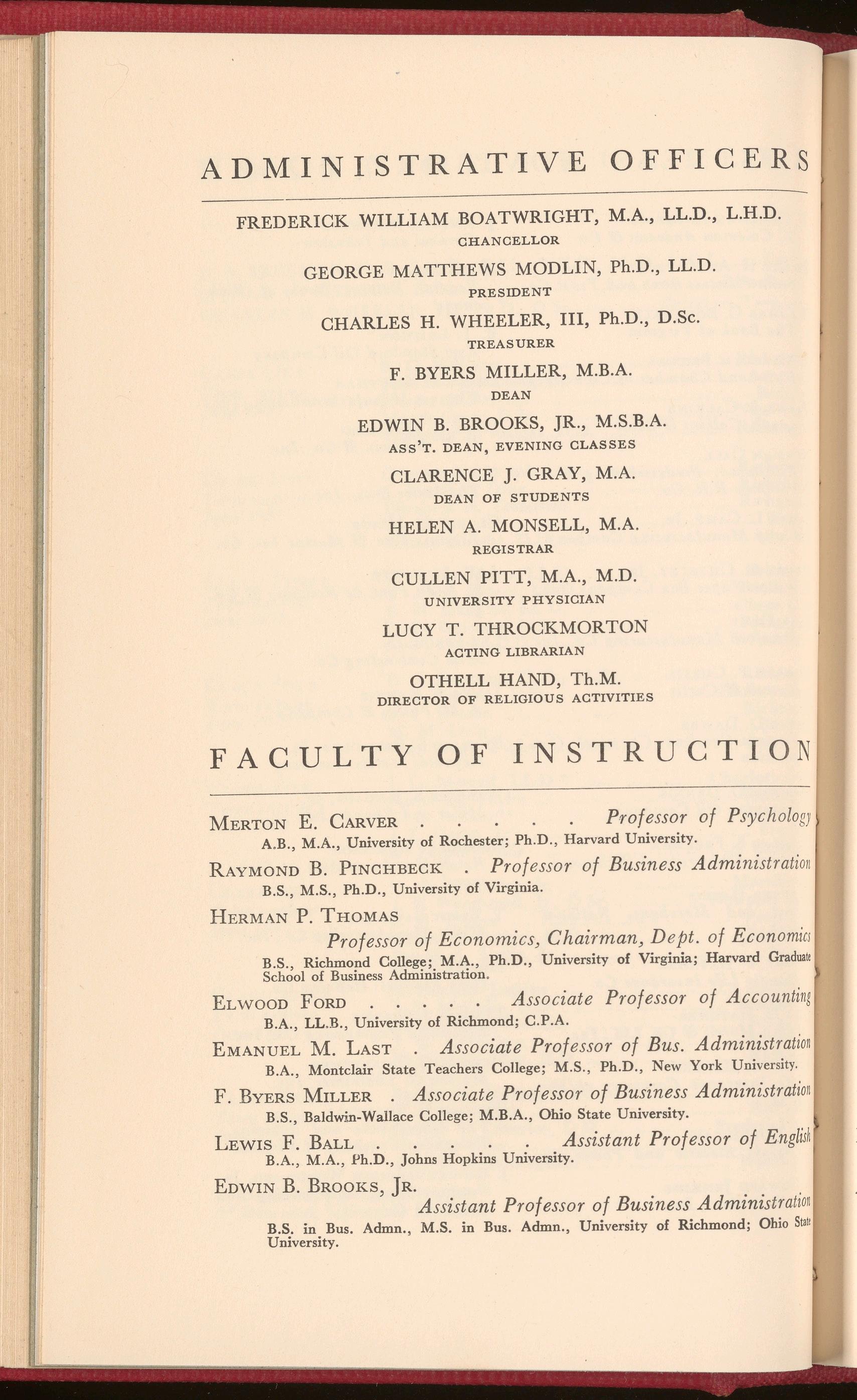
Associate Professor of Accounti ni
B.A., LL B. , University of Richmond; C P.A.
EMANUEL M. LAST Associate Prof essor of Bus. Administrati on B.A., Montclair State Teachers College; M.S., Ph.D ., New York Univer sity, F. BYERS MILLER . Associate Professor of Business Administration
B.S., Baldwin-Wallace College; M.B.A., Ohio State University.
LEWIS F. BALL . • . Assistant Professor of Eng/is ! B.A. , M.A., .Ph.D., Johns Hopkins University.
EDWIN B. BROOKS, JR.
Assistant Professor of Business Administra tion
B.S. in Bus. Admn., M.S. in Bus. Admn., University of Richmond; Ohio Stal l University.
BEN F. CURRY . • Assistant Professor of Economics
A.B., Florida Southern College; M.A., University of North Carolina.
E. SHERMAN GRABLE Assistant Professor of Mathematics
B.S., M.A., Washington and Jefferson College; Yale University.
AusTIN E. GRIGG
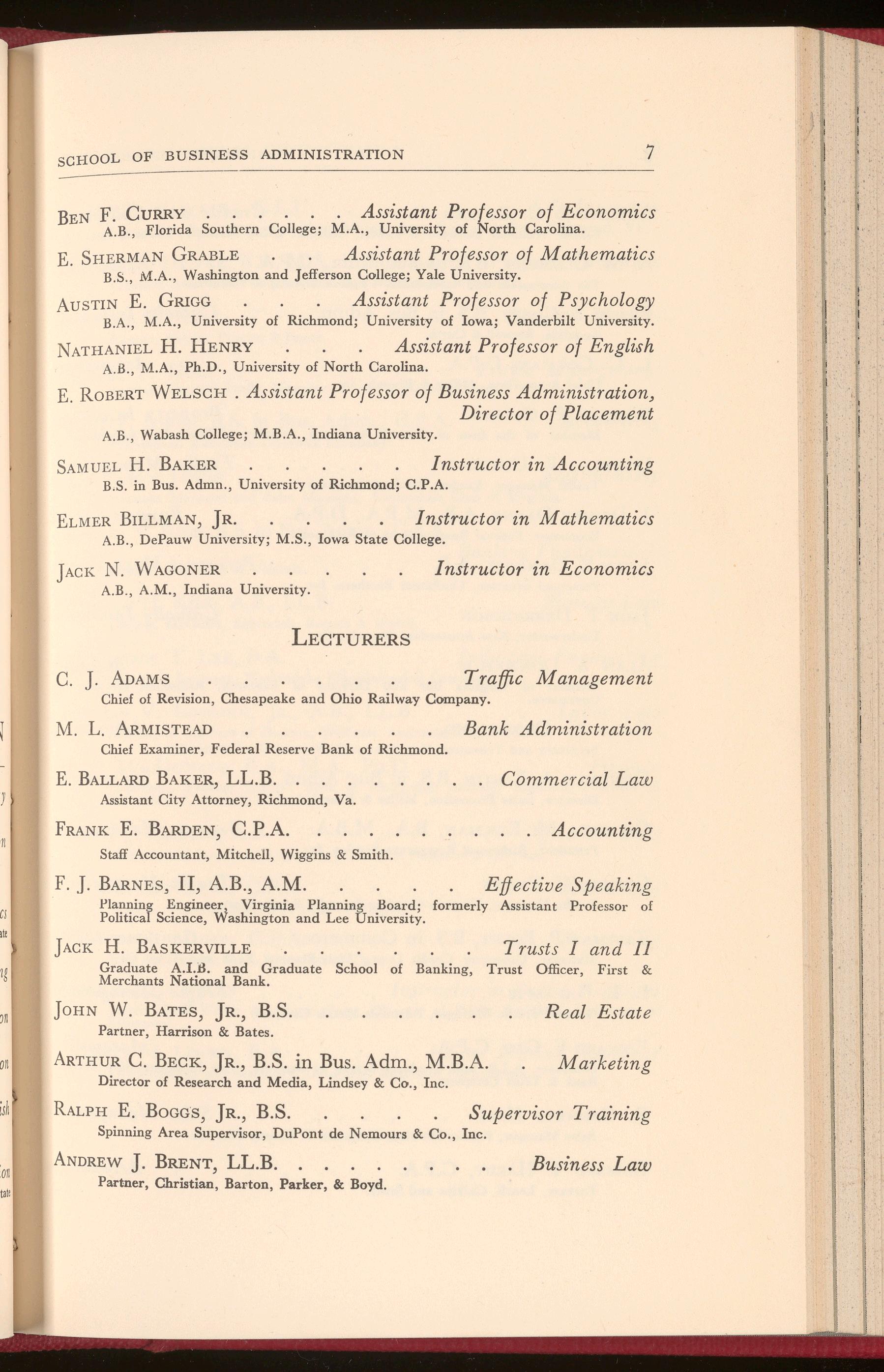
Assistant Professor of Psychology
B.A., M.A., University of Richmond; University of Iowa; Vanderbilt University.
NATHANIEL H. HENRY Assistant Professor of English
A.B , M.A., Ph.D , University of North Carolina.
E. ROBERT WELSCH . Assistant Professor of Business Administration, Director of Placement
A.B , Wabash College; M.B A., Indiana University.
SA M U E L H. BAKER Instructor zn Accounting
B.S in Bus Admn., University of Richmond; C.P.A
ELMER BILLMAN, JR. Instructor zn Mathematics
A.B., DePauw University; M.S., Iowa State College.
JAC K N. WAGONER Instructor zn Economics
A.B. , A.M . , Indiana University.
C. J. ADAMS Traffic Management
Chief of Revision, Chesapeake and Ohio Railway Company.
M. L. ARMISTEAD Bank Administration
Chief Examiner, Federal Reserve Bank of Richmond.
E. BALLARD BAKER, LL.B.
Assistant City Attorney, Richmond, Va.
Commercial Law
FRANK E. BARDEN, C.P.A. Accounting
Staff Accountant, Mitchell, Wiggins & Smith.
F J. BARNES, II, A.B., A.M. Effective Speaking
Planning Engineer Virginia Planninll'_ Board; formerly Assistant Professor of Political Science, Washington and Lee University.
JACK H. BASKERVILLE Trusts I and II
Graduate A.LB. and Graduate School of Banking, Trust Officer, First & Merchants National Bank.
JOHN w. BATES, JR.,B.S. Real Estate Partner, Harrison & Bates.
ARTHUR C. BECK, JR., B.S. in Bus. Adm., M.B.A. Marketing Director of Research and Media, Lindsey & Co., Inc.
RALPH E. BoGGS, JR., B.S. Supervisor Training Spinning Area Supervisor, DuPont de Nemours & Co., Inc.
ANDREW J. BRENT, LL.B. Business Law
Partner, Christian, Barton, Parker, & Boyd
8
SHERWOOD C. BUTLER
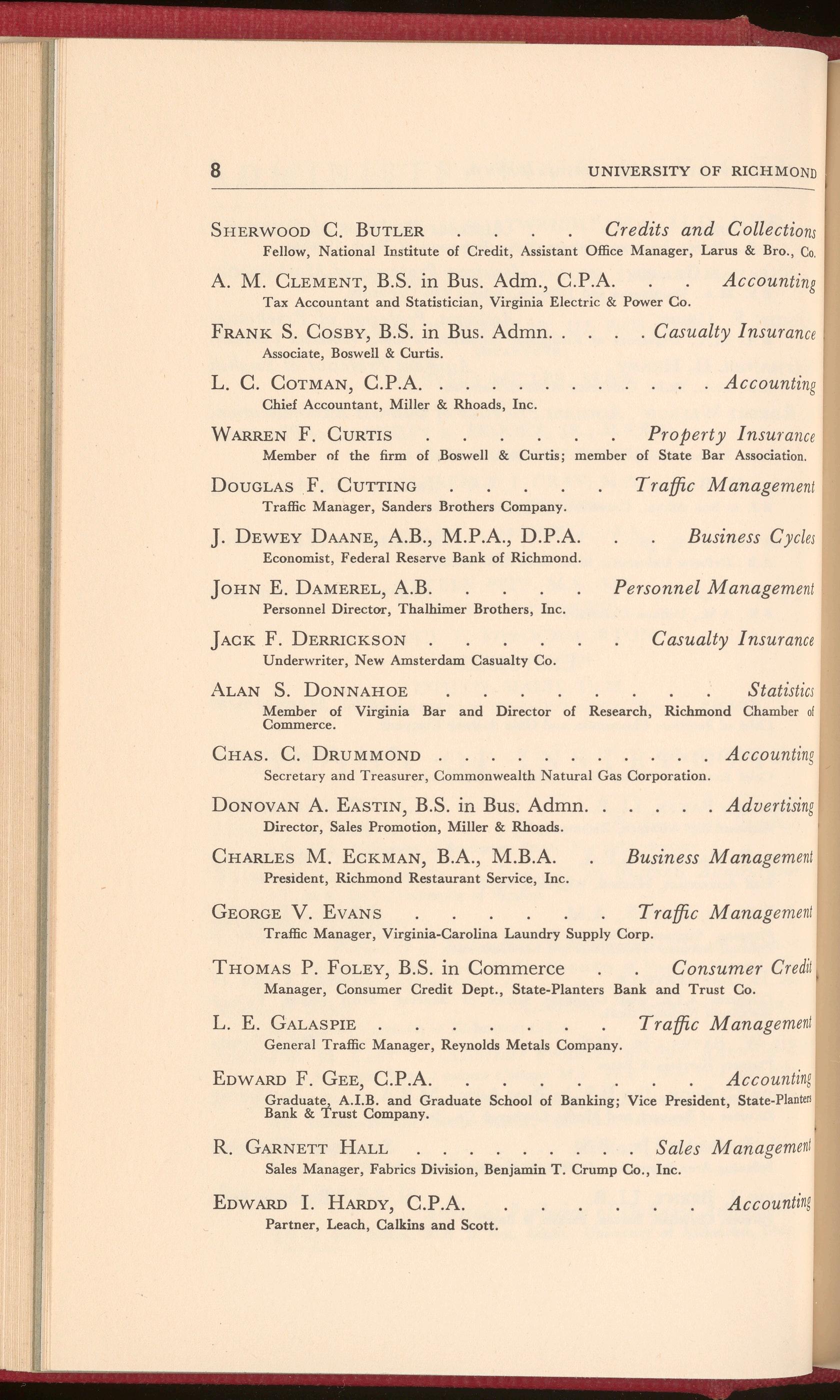
UNIVERSITY OF RICHMOND
Credits and Collections Fellow, National Institute of Credit, Assistant Office Manager, Larus & Bro., Co.
A. M. CLEMENT, B.S. in Bus. Adm., C.P.A. Accounting Tax Accountant and Statistician, Virginia Electric & Power Co.
FRANK S. CosBY, B.S. in Bus. Admn. Casualty Insurance Associate, Boswell & Curtis.
L. C. COTMAN, C.P.A. . Accounting Chief Accountant, Miller & Rhoads, Inc.
WARREN F. CuRTIS Property Insuranc e Member of the firm of ,Boswell & Curtis; member of State Bar Association
DOUGLAS ,F. CUTTING Traffic Management Traffic Manager, Sanders Brothers Company.
J. DEWEY DAANE, A.B., M.P.A., D.P.A. Business Cycles Economist, Federal Reserve Bank of Richmond
JoHN E. DAMEREL, A.B. Personnel Management Personnel Director, Thalhimer Brothers, Inc.
JACK F. DERRICKSON Casualty Insurance Underwriter, New Amsterdam Casualty Co
ALAN S. DoNNAHOE Statistics Member of Virginia Bar and Director of Research, Richmond Chamber of Commerce.
CHAS. C. DRUMMOND Accountin g Secretary and Treasurer, Commonwealth Natural Gas Corporation.
DONOVAN A. EASTIN, B.S. in Bus. Admn Advertising Director, Sales Promotion, Miller & Rhoads
CHARLES M. ECKMAN, B.A., M.B.A. Business Management President, Richmond Restaurant Service, Inc.
GEORGE V. EVANS Traffic M anagemenl Traffic Manager, Virginia-Carolina Laundry Supply Corp.
THOMAS P. FoLEY, B.S. in Commerce Consumer Credi t Manager, Consumer Credit Dept., State-Planters Bank and Trust Co.
L. E. GALASPIE Traffic M anagemenl General Traffic Manager, Reynolds Metals Company.
EDWARD F. GEE, C.P.A. Accounting Gradual~ A.I.B. and Graduate School of Banking; Vice President, State-Planten Bank & lrust Company.
R. GARNETT HALL Sales M anagemen l Sales Manager, Fabrics Division, Benjamin T. Crump Co., Inc.
EDWARD I. HARDY, C.P.A. Accounting Partner, Leach, Calkins and Scott.
JAMESD. HAWKINS, C.L.U. Life Insurance
Production Supervisor, Provident Mutual Life Insurance Co., Richmond, Va.
GEORGEC. HENKE, B.S., M.S., in Bus. Admn. Property Insurance Assistant Secretary, Virginia Fire and Marine Insurance Co.
BERNARDS. HoLT Security Markets Partner, Abbott, Proctor & Payne.
RoBERTP. HoLT Traffic Management
Assistant General Traffic Manager, Reynolds Metals Company.
CECILF. JONES, B.S. in Bus. Admn., C.P.A. . Accounting Accountant, Richmond Livestock Company.
A RIDGELYJoNES . Salesmanship
Assistant Manager and Sales Manager, Automobile Club of Virginia.
AUBREYV. KrnD, B.S. in Bus. Admn., C.P.A.
Cashie r , The Bank of Virginia.

WILLIAMH. KING, A .B., LL.B. Business Law Lawyer, McGuire, Eggleston, Bocock & Woods
ST. GEORGET. LEE, B.A. Industrial Engineering Industrial Engineer, Wortendyke Manufacturing Company.
FRANCISV. LOWDEN,JR., A.B., LL.B . Labor Law Member of the tirm of Hunton, Williams, Anderson, Gay & Moore
E. F. MACDONALD,B.A., M.A., Ph.D. Finance
Economist, Federal Reserve Bank of Richmond; formerly Associate Professor of Economics, University of Richmond
FRANKJ. MARTIN,A.B. Office Methods Methods and Standards Engineer, DuPont de Nemours & Co., Inc.
JoHN S. McCLURE, C.P.A. Accounting Assistant Vice-President, The Bank of Virginia
NORMANJ. MOHR, C.P.A. Accounting Stab Accountant, F. L. Worcester & Co.
JosEPH E. NETTLES Instru ctor in Public Relations
Former Staff Writer Associated Press, Director of Public Relations, University of Richmond.
EVERETTM. OwEN, B.A. Inland Marine Insurance Vice-President and Secretary, Davenport Insurance Corporation.
UNIVERSITY OF RICHMOND
VICTOR E. PREGEANT, III, B.A., LL.B. Business Law Assistant City Attorney, Richmond, Va. Investments
JOI -IN B. PURCELL, B.A., M.B.A. Investment Division, First and Merchants National Bank.
ROBERT B. RAWLES, B.A. Life Insurance Finance Investments Department, Atlantic Life Insurance Co.
GEORGE w. REILLY, A.B. Commercial Law and Negotiable Instrument s Harvard Law :School; member of the firm of Mitchell & Reilly.
J. GARLAND RowLETT, C.P.A. Accounting Assistant Finance Officer, Veterans Administration District Office
Life Insurance Law
A. B. ScoTT, B.A., LL.B. General Counsel, Atlantic Life Insurance Company; formerly Assistant Professor of Law, University of Virginia.
AUGUSTUS M. SPONG, JR. Advertising Advertising Staff, Richmond Newspapers, Inc.
T. I. STORRS, B.A. Federal Reserve Economist, Federal Reserve Bank of Richmond.
HARTWELL F. TAYLOR Fundamentals of Banking Graduate A.I.B.; Assistant Vice-President, Bank of Virginia.
EDWARD A. WAYNE Bank Administratio n Graduate A.I.B.; Vice-President, Federal Reserve Bank of Richmond.
DAVID MEADE WHITE, LL.B. Business Law Attorney, Richmond, Va. Accounting
J. AsA WHITT, C.P.A. Partner, Baker, Brydon, Rennolds and Whitt, Certified Public Accountants.
DONALD S. WILLCOX, B.A., M.B.A. Economic! Trust Dept ., State Planters Bank & Trust Co.
LILLIAN W. McGRATH
DOLORES POWELL
DELLA THOMASSON

Secretary, Evening Divisio n
Secretary, Day Division
Secretary, Evening Divisio n

ACADEMICCouNCIL: Miller, Thomas, Pinchbeck, Last, Ford.
ADMISSIONS: Miller, Thomas, Welsch.
CATALOGUE:Brooks, Wagoner, Curry.
PERSONNEL: Welsch, Last, Thomas, Gray, Carver, Hand .
V1sUAL Arns: Last, Baker, Curry.
UNIVERSITYCOMMITTEE ON ARTS: Wagoner.
UNIVERSITYCOMMITTEE ON CONVOCATIONS: Thomas.
UNIVERSITYCOMMITTEE ON FACULTY MEETINGS: · Brooks.
UNIVERSITYCOMMITTEE ON FACULTY SOCIAL AFFAIRS: Curry.
UNIVERSITY COMMITTEE ON FACULTY RESEARCH: Thomas.
UNIVERSITYCOMMITTEE ON GRADUATE SCHOLARSHIPS: Miller.
UNIVERSITY COMMITTEE ON PUBLIC LECTURES, CONCERTS AND BROAD· CASTS: Last.
UNIVERSITYCOMMITTEE ON SCHEDULE: Brooks.
UNIVERSITYCOMMITTEE ON VESPERS AND RELIGIOUS LIFE: Thomas.
UNIVERSITY SENATE: The President, the Deans and the members of the Academic Councils of the six Colleges of the University.
The President and Dean of the School are ex officio members of all committees.

The School of Business Administration had its origin m 1920 as the department of economics in Richmond College which eventually became the department of economics and applied economics. In 1924 the Evening School of Business Administration was organized as a separate division of the University of Richmond. In 1949 the department of economics and applied economics in Richmond College and the Evening School of Business Administration were combined to form the School of Business Administration with both day and evening classes. Day classes are conducted on the three hundred acre University campus in suburban Westhampton about five miles from the center of Richmond. Evening classes meet in the Columbia Building, Grace and Lombardy Streets, on the site of the old Richmond College campus.
The School of Business Administration is one of the six divisions of the University of Richmond, which was founded and is supported by the Baptists of Virginia. Other divisions with dates of founding are Richmond College ( 1832); The T. C. Williams School of Law (1870); Westhampton College (1914); the Summer School (1920); and the Graduate School (1921). Each college has its own dean, its own faculty, and its own institutional life. The University Senate, on which sits representatives of all the faculties, provides for intercollegiate cooperation.
The legal name of the corporation is UNIVERSITYOF RICHMOND. The Board of Trustees of the University of Richmond controls all endowment and other funds and makes all appropriations. The degree of Bachelor of Science in Business Administration as well as all degrees for work done in any of the colleges is conferred by the University of Richmond. Ultimate authority is vested in the Board of Trustees and the President of the University.
Richmond is an ideal location for a School of Business Administration because of the large number of establishments which are available as business laboratories and clinics, the diversity of business activity, and its proximity to Washington, D. C. and large business centers.

The libraries of the University contain over 100,000 volumes. The main collection of the University Library is housed in the Charles Hill Ryland Building. A large reading room and a specialized library dealing with economic subjects and current business affairs are maintained in the Columbia Building especially for the use of evening students.
Special collection of books, pamphlets and research materials are maintained by the Richmond Society of Public Accountants, the Richmond Chapter of the National Office Management Association, and the Richmond Chapter of the American Institute of Banking.
The University of Richmond holds a number of scholarships which pay in whole or in part the tuition or other fees of students who are appointed to receive their benefits. Scholarship appointments do not apply to the Summer School.
Persons seeking scholarship appointment should make application by April 1 each year for the session opening the following September. Application should be made on a printed form which may be obtained from the UNIVERSITYCOMMITTEEON SCHOLARSHIPS, University of Richmond, Va. Most of the scholarship appointments are made in April, and the complete list is made up by July 1.
The University provides a number of "Service Scholarships" which require the holder to make some return in service to his college while he holds the scholarship. Service Scholarships are rarely granted to freshmen.
A student who has been granted a scholarship, in order to make his appointment effective, must deposit with the University Treasurer before August 1 the sum of twenty-five dollars ($25.00). This deposit will be applied in full on the college fee of the non-resident student. The dormitory student who makes a room deposit of ten dollars ($10.00) need make an additional deposit, on account of his scholarship, of only fifteen dollars ($15.00). A student who has made a College Fee deposit of twenty-five dollars ( $25.00) need make no additional scholarship deposit. The scholarship deposit is not refundable if a student fails to matriculate.

The University also holds several loan funds from which loans not exceeding $200 in any one year may be made to worthy members of the junior and senior classes
The student self-government organization, known as the Stud ent Government of the School of Business Administration, was established by the students to represent and further the best intere sts of the student body and the School in general, and to bring about cooperation and efficiency among the various student organization s. Each full-time student is a member of this organization. It is vitally concerned with maintaining the honor system in the School. Part-time students are represented by the Stud ent Advisory Committee, the members of which are elect ;:,d by the student s in the evening classes.
The Honor System requires that a man shall in all the relation s of student life act honorably. Breaches of Honor Code are cheating , violations of signed pledges , stealing, lying, failure to report violations of the Honor Code, and, in general, breaking one's word of honor under any circumstances.
1. The Pledge: "On my honor as a gentleman, I have neither given nor received aid."
2. Meaning of the Pledge: The pledge on quizzes, examinations , written problems, and exercises means that the work which the student hands in to his professor is his own, which he himself has done in accordance with the requirements laid down by the faculty in the regulations set forth below .
3. Exercise Care: It is also important that everyone should ex ercise the greatest care to keep himself free from suspicion of evil. Such practices as leaving the examination room for any length of time unaccompanied or too frequently, or taking an examination alone, or bringing texts and note books into the examination room , or carelessly glancing toward another student's paper-these are

discouraged by the Honor Council. While they do not of themselves constitute infringements of the Honor Code, such practices are dangerous for both the individual and the continued well-being of the Honor System.
All students should take every opportunity of acquainting themselves in detail with the working of the Honor System as well as with these general principles.
The Honor System is a principle of conduct and not a set of rules for conduct. It should be understood that the following statem ent is intended only to cover the chief and most easily misunderstood applications of that principle, and not to serve as a substitute for it.
I. No t est, examination, theme, term paper, or parallel reading report will be accept e d which does not have the customary pledge written out in full and signed.
II. T h e placing of the pledge on a test or examination paper means that t h e stud e nt h a s us e d no books, notes, or other aids except by explicit p ermission of the instructor
A. Wh en a book is used by permission of the instructor, it must be free from annotations in that part of the book used.
B. When an oral test is giv en, no books or notes are to be used except by explicit permission of the instructor .
III The placing of the pledge on a term paper or theme m eans that the work is th e student's own and contains no plagiarism-that is, theft from anoth e r writer. There are two kinds of plagiarism : copying the id eas or facts belonging to another; and copying his words.
A. To avoid the first kind, it is necessary, whenever the student consults any reference work or other source, that h e give in the body of his paper or in a footnote th e name of the ref er e nce work or author.
B. To avoid the second, it is necessar y , whenever the stud e nt uses th e words of another, that he enclose them in quot a tion marks and give in his paper or in a footnote the name of the author.
C. Plagiarism is not avoided by using the words of another with a few alterations.
D In ge neral, it is not undesirable for students to co-op erate or to help one another in the preparation of their them es, or even in the shaping of the material for their themes. It must be clearly understood, however, that the actual papers must be written without aid
IV. The placing of the pledge on a parallel reading test or r eport means that the student has actually read the book or number of pages claimed
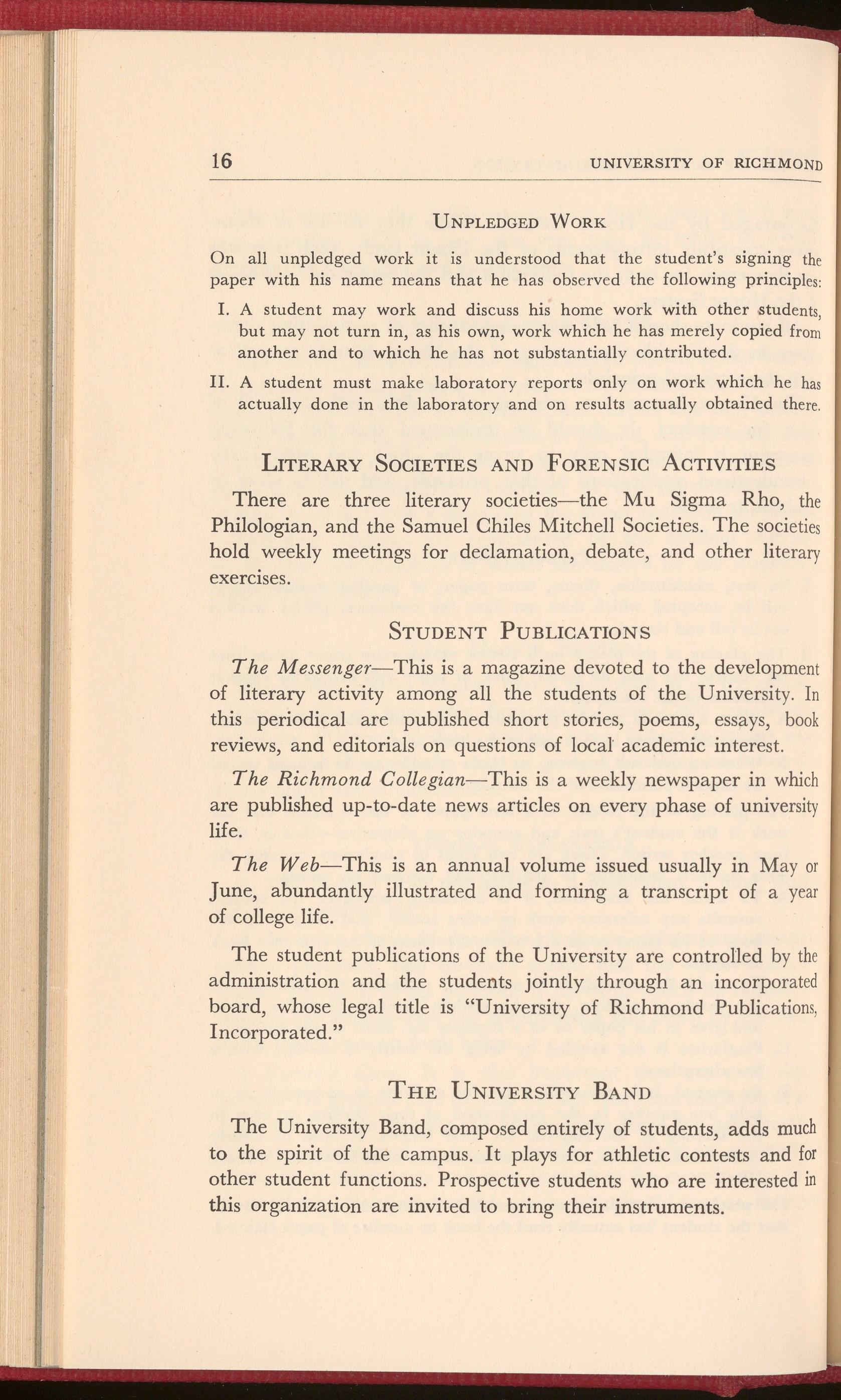
On all unpledged work it is understood that the student's signing the paper with his name means that he has observed the following principles:
I. A student may work and discuss his home work with other ,students, but may not turn in, as his own, work which he has merely copied from another and to which he has not substantially contributed.
II. A student must make laboratory reports only on work which he has actually done in the laboratory and on results actually obtained there .
There are three literary societies-the Mu Sigma Rho, the Philologian, and the Samuel Chiles Mitchell Societies. The societies hold weekly meetings for declamation, debate, and other literary exercises.
The Messenger-This is a magazine devoted to the development of literary activity among all the students of the University In this periodical are published short stories, poems, essays, book reviews, and editorials on questions of local academic interest.
The Richmond Collegian-This is a weekly newspaper in which are published up-to-date news articles on every phase of university life.
The Web-This is an annual volume issued usually in May or June, abundantly illustrated and forming a transcript of a year of college life.
The student publications of the University are controlled by the administration and the students jointly through an incorporated board, whose legal title is "University of Richmond Publication s, Incorporated."
The University Band, composed entirely of students, adds much to the spirit of the campus. It plays for athletic contests and for other student functions. Prospective students who are interested in this organization are invited to bring their instruments.

The University Choir, composed of students from all divisions of the University, sings at Convocations and other University functions.
This club offers opportunity to learn to read music at sight, and the experience gained enables many of the members to lead other groups in singing.
The University Players is the University dramatic organization, open to all students in the University, and working in conjunction with the Department of Dramatic Arts.
The University Playhouse and the Luther H. Jenkins Greek Theatre are equipped for experimentation and production. The workshop offers the technical student opportunity for experimentation in the dramatic field.
Each year keys are presented to those members of the two upper classeswho have rendered conspicuous service to the organization.
An active Young Men's Christian Association is maintained in the University. Its object is to promote the spiritual and moral welfare of the students. Meetings, addressed by representative students, faculty members, and prominent men from Richmond, are held weekly.
There are eleven national Greek-letter social fraternities in the University of Richmond. They are: Phi Delta Theta, Phi Gamma Delta, Phi Kappa Sigma, Sigma Alpha Epsilon, Theta Chi, Kappa Alpha, Kappa Sigma, Pi Kappa Alpha, Sigma Phi Epsilon, Lambda Chi Alpha, and Phi Alpha. Two representatives from each of these fraternities and the faculty committee on fraternities constitute the Interfraternity Council. The operation and conduct of all fraternal groups are subject to the strict regulation of the admini!tration and faculty of the University.

1. The Charles T Norman Medal for the best graduate in Business Administration has been endowed by Mr. Norman and is awarded annually.
2. The T. Coleman Andrews & Company award of twenty-fiv e dollars is awarded to the student in any of the evening classes in advanced accounting who is deemed by the dean and the facult y to be best equipped by character, personality, intellectual capacity, and broad educational training to succeed in the profession of accountancy.
3. The Life Agency Managers prize, established by the Life Agency Managers of Richmond, is given to the student who attains the highest scholastic standing in the life insurance classes.
4. The Sales Executives Club of Richmond awards a prize to the student who attains the highest standing in the salesmanship class.
5. The Richmond Chapter of the National Office Managem ent Association awards a prize to the student receiving the high est grade in the office management class.
6. The Richmond (Va.) Traffic Club awards prizes to the two best students in each of the classes in traffic management.
Omicron Delta Kappa-for the recognition of high attainment s in scholarship, athletics, literary endeavor, and social leadership .
Tau Kappa Alpha-for the recognition of forensic and debatin g attainments.
Pi Delta Epsilon-for the recognition of attainment in journ alistic activities.
Society for the Advancement of Management-for the recognition of high attainments in the School of Business Administration .
Early in the second semester the University holds an honors convocation, under the joint auspices of the several honor societies.

At this convocation elections to the several honor societies are made public.
Students have easy access to all the advantages afforded by the various city and suburban churches, with their Bible classes, Sunday Schools and worship services. Prayer meetings conducted by the students themselves are held once, or oftener, every week. On Thursdays at 7: 30 P.M., the University unites in a Vesper Service for praise and prayer and a spiritual message.
Students and faculty attend the College assemblies from 11 : 30 to 12: 20 o'clock on the first and third Tuesdays and each Thursday. The Tuesday meetings are for School of Business only; the Thursday meetings are convocations of the University. From time to time, prominent visiting speakers address these assemblies on educational, civic, and religious themes. These assemblies give opportunity for announcements of interest and importance to the students and for presentation of student affairs.
Attendance at assemblies and convocations is required of all students. Three unexcused absences are permitted each semester. For each unexcused absence in excess of three, a student is required to add a half-semester hour to the requirements for the degree for which he is a candidate.
Alumni of the University have long been organized into the General Society of Alumni, which holds annual meetings to renew old associations, maintains a close connection with Alma Mater, and furthers the cause of higher education. The association engages the services of an alumni secretary and publishes an alumni magazine.
The officers of the society are: William Hugh Bagby, Baltimore, Md., President; D. N. Davidson, Orange, Va., Chairman Alumni Council; and Joseph E. Nettles, Richmond, Va., Secretary.
INSTRUCTION BY BUSINESS MEN AND PROFESSIONAL TEACHERS
Two groups are represented in the faculty of the School of Business: the professional university instructor who is devoting his life to education as a career, and the active business executive or government official who has achieved success in his vocation and who is willing to conduct a college course in the field of his major interest. Most of the business men who are affiliated with the School's faculty have had former teaching experience. Throu gh these two groups, each with its special emphasis, there result s a balanced education which gives due weight to both the theor etical and the practical.
To supplement the instruction offered by members of the re gular faculty of the School of Business Administration, a numb er of prominent business executives and government officials in Ri chmond have generously agreed to meet with various classes and give to the students the benefit of their specialized knowledge and experience.
DAY CLASSES
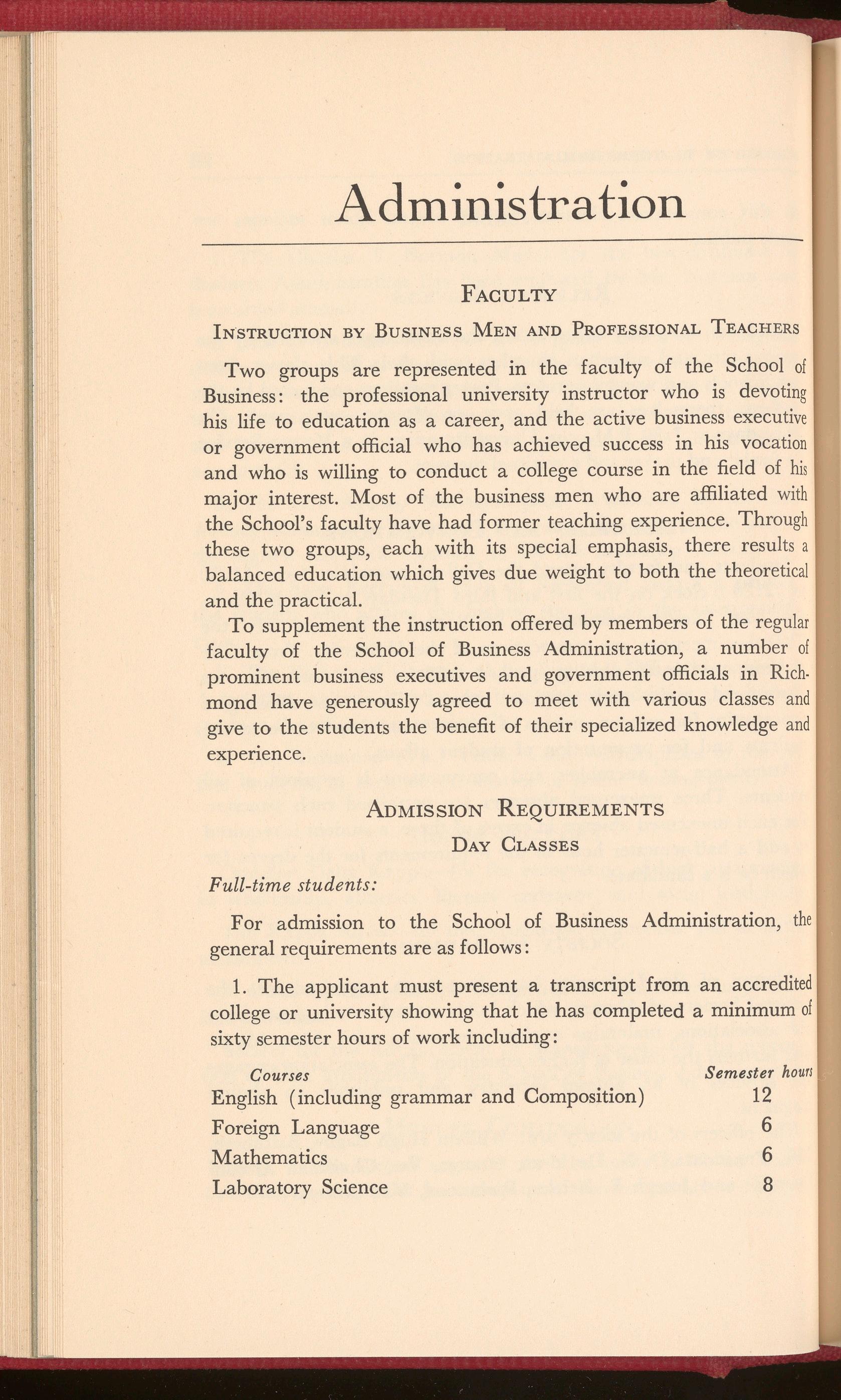
Full-time students:
For admission to the School of Business Administration, the general requirements are as follows:
1. The applicant must present a transcript from an accredited college or university showing that he has completed a minimum of sixty semester hours of work including:

2. The applicant must have earned a minimum of sixty quality credits. Quality credits are calculated from academic hours on the following basis: each semester hour passed with grade A shall count three quality credits; with grade B, two quality credits; with grade C, one quality credit; with grade D, no quality credit.
3. Admission is open to men and women students. No University residence facilities are available for women students.
Part-time students:
Part-time students may be admitted to day classes on the same basis as for evening classes as listed below.
Four classifications of students, both men and women, are admitted into the Evening Classes of the School of Business Administration:
( 1) Special students. Adults over twenty-one years of age who are not high school graduates may be admitted as special students.
(2) High school graduates. Young men and women who have graduated from high school with at least fifteen approved units are eligibleto enter.
(3) Present or former college students. To those young people who have attended college a year or more without graduating, the School of Business offers an -opportunity to continue their university training while being employed. Courses are also elected for credit by undergraduates now attending other divisions of the University, especially in Richmond College and the T. C. Williams School of Law.
(4) College graduates. Many students enrolled in the Evening Classes are college and university graduates. Graduates of liberal arts colleges who wish to extend their general education, graduates of engineering colleges who wish to supplement their technical knowledge, and graduates of university schools of commerce who
* A grade of at least a C must have been earned in the Principles of Economics.

UNIVERSITY OF RICHMO ND
wish to specialize further in particular fields of activity, have found benefit in the training provided. College graduates can also obt ain in the evening credits leading to the degr ee Master of Science in Business Administration and Master of Arts in Economics .
The Director of Placement, with the assistance of the Dean of Students and the Faculty Personnel Committee, plans and supervises a program of student personnel services design ed to stimulat e the highest possible morale , scholarship, and general well-bein g of students in the School of Business Administration. Personn el histories and other pertinent information relating to the activitie s of students and details of th eir college careers are a ssembled and m a intained on file in the office of the Director of Placement. Each new full-time student is required to take a series of p sychological tests during th e first month of school. The results of th ese tests are used for vocational counseling, for advising on proper course of study , and for placem ent purpo ses upon graduation . Each full-time student is assigned a Faculty Adviser according to his field of concentration. He meets at regular intervals with his Adviser to discuss his program of study, his progress and such other problems as he may desire. The student is required to have a conf ere nee w ith his adviser at least once a month.
Excellent provision is made for care of the health of all students resident on the campus. During Orientation Week a thorou gh physical examination by the university medical staff is requir ed of all new students. Dormitory and fraternity house students r eceive the daily attention of the college physician and his assistants Infirmary rooms are provided, to which students are removed whenever necessary. There is no extra charge for the use of infirmary rooms or for the attendance of the physician's assistants who look after the needs of the sick.

The President of the University has general oversight and control of athletics and is authorized to forbid any features in these exercises which endanger the health or morals of the participants.
The University holds membership in the Southern Athletic Conference and the National Collegiate Athletic Association, and all intercollegiate sports are subject to the rules and regulations of these organizations. A committee of the faculty has charge of the enforcem€nt of these regulations.
After the close of formal matriculation, no student is permitted to add or drop a course or change his section without the approval of the Dean.
No change in a course of study will be permitted later than one week from the opening date of the semester, except in unusual casesrecommended by the Dean.
For any course dropped by day students after the first week of the semester, the grade "F" will be recorded. For any course dropped by evening students after mid-semester, the grade "F" willbe recorded.
All requests to drop classes must be made in writing to the Dean.
The standing of students in class work and in examinations is indicated as follows: the letter A indicates that the work has been excellent (95-100); B, that it has been very good (88-94); C, that it has been average (80-87); D, that it has been just passing (75-79); and E and F indicate failure.
The grade "E" is a failing grade. However, this grade may be changed to "E-o.k." and full semester credit allowed under the followingconditions:

1. Upon the written recommendation of the professor, the stu. dent may be allowed a special examination, the passing of which will give full semester hour credit for the course.
2. Upon the written recommendation of the professor and the approval of the general faculty, full semester hour credit will be allowed for the first semester of a continuous course becaus e of subsequent good work or supplemental work during the following semester in that course.
No quality credits may be allowed in either case.
A student who has received an incomplete grade on a seme st er's work must complete this work within twelve months from the beginning of the semester in which this incomplete grade was incurred.
If a student has a failing grade in both semesters of a continuou s course, the course must be repeated. Special examinations may be given only on the dates specified in the College Calendar and upon authorization from the Dean's office, preceded by the payment of a fee of two dollars . All arrangements for sp ecial examinations must be made at least two weeks before the date of the examination. A student is permitted only one special examination on any cour se, and this must be taken within twelve months from the beginning of the semester in which the grade of "E" was incurred.
All seniors must make up all failing and incomplete grades of previous sessions by the end of the first semester . A senior may not make up by a special examination a deficiency on more than one subject taken in the senior year, and this examination may not be given until the end of the second semester If at the end of the first semester a senior has failed on as many as two subj ects required for his degree he cannot remain a member of the senior class without special action of the faculty.
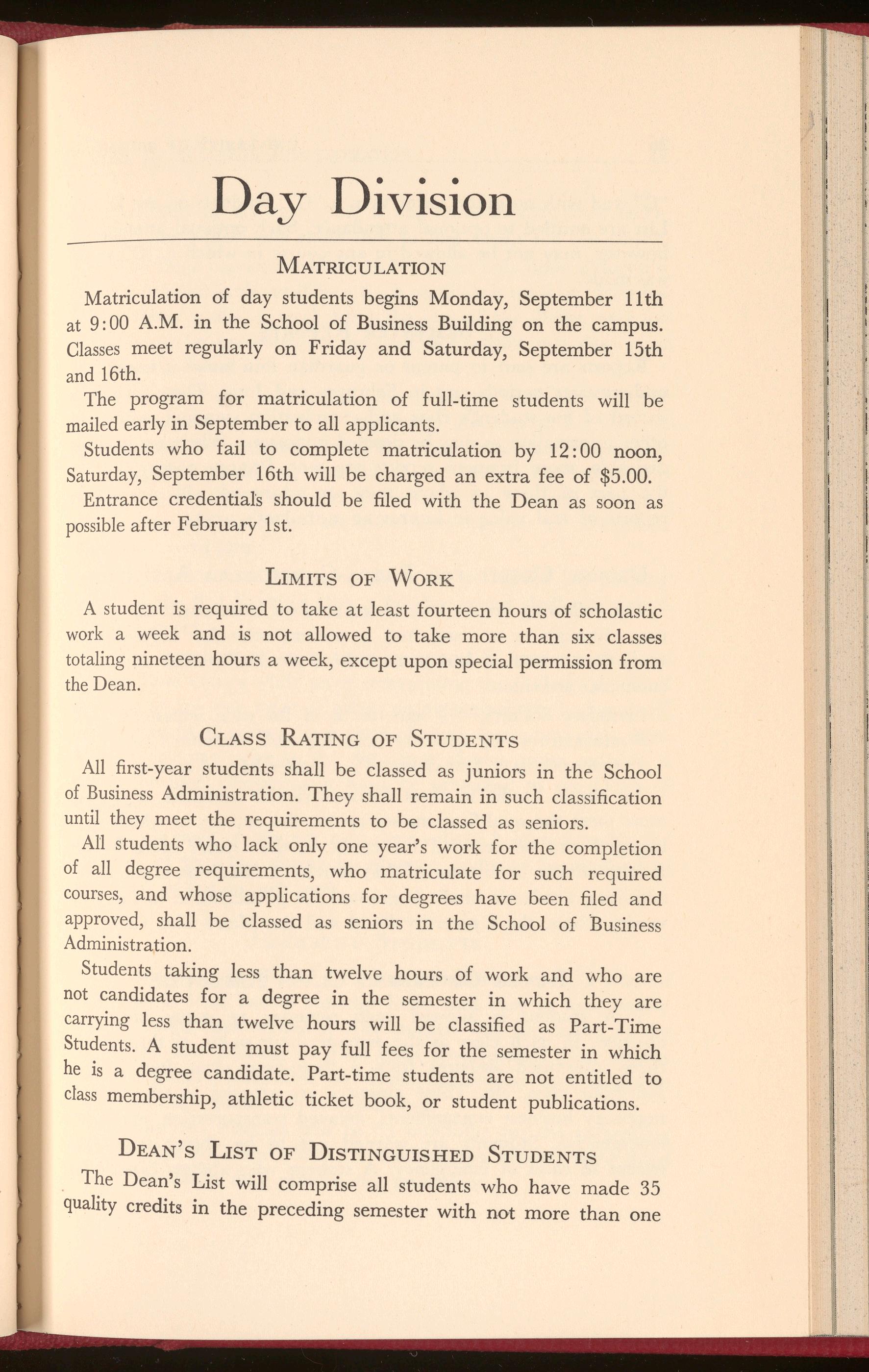
Matriculation of day students begins Monday, September 11th at 9: 00 A.M. in the School of Business Building on the campus. Classes meet regularly on Friday and Saturday, September 15th and 16th.
The program for matriculation of full-time students will be mailed early in September to all applicants.
Students who fail to complete matriculation by 12: 00 noon, Saturday, September 16th will be charged an extra fee of $5.00.
Entrance credentials should be filed with the Dean as soon as possibleafter February 1st.
A student is required to take at least fourteen hours of scholastic work a week and is not allowed to take more than six classes totaling nineteen hours a week, except upon special permission from the Dean.
All first-year students shall be classed as juniors in the School of Business Administration. They shall remain in such classification until they meet the requirements to be classed as seniors.
All students who lack only one year's work for the completion of all degree requirements, who matriculate for such required courses, and whose applications for degrees have been filed and approved, shall be classed as seniors in the School of Business Administration.
Students taking less than twelve hours of work and who are not candidates for a degree in the semester in which they are carrying less than twelve hours will be classified as Part-Time Students. A student must pay full fees for the semester in which he is a degree candidate. Part-time students are not entitled to class membership, athletic ticket book, or student publications.
The Dean's List will comprise all students who have made 35 quality credits in the preceding semester with not more than one

"C" and with no grade lower than a "C". Students on the Dean' s List are entitled to optional attendance. Such optional attendance , however, may not be allowed in any course in which a "C" grade was made.
Reports are sent to parent or guardian four times a session: at mid-semester periods and in February and June. These include a record of the student's class and examination standing, with such other information as may be deemed important. Whenever it seems desirable, more frequent reports are sent. Prompt cooperation on the part of those to whom they are addressed will make the se reports of real value in improving a student's work.
The following credits may be granted for extra-curricular activities, although in no case may a student offer for degree cr edit more than a total of four hours in both physical exercise and extracurricular activities.
LITERARYSocIETY-½ semester hour for each semester' s work.
PUBLICATIONS-½ semester hour for each semester's work
INTERCOLLEGIATEDEBATING-½ semester hour a session .
To obtain credit in these extra-curricular activities, a student must meet the qualifications set up for the activity in which he is engaged and be certified for credit to the Dean's office by the faculty adviser or director of that activity. In addition to the above activities, academic credit is granted for participation in the University Choir, the University Band and the Men's Glee Club.
1. A student is allowed each sem ester as many unexcu sed absences in each class as the semester-hour value of that cla ssthree unexcused absences from a three-hour class, four from a four-hour class, etc. These absences a r e granted to take care of necessary business engagements, delayed transportation , a nd oth er emergencies. Students are warned not to be absent from class except in cases of emergency. A student who absents him self for

trivial reasons in the early part of the semester may have emergencies later which will cause him to lose credit for the course.
2. The Dean can excuse absences for illness only upon a doctor's, parent's or guardian's certificate. Such certificates must be presented to the Dean within a week from the end of the illness, and the excuse must be presented to the professor within two days after the Dean has issued it
.3. Each professor shall notify the Dean as soon as a student has the maximum number of unexcused absences in his class. A student shall be excluded from the class immediately upon his exceeding this maximum, and the Dean shall be notified of this action at once. No credit can be received for a course in which the student has exceeded the maximum number of unexcused absences allowed him.
4. An absence from a class or laboratory period the last meeting before or the first meeting after a holiday period shall be counted as two absences.
5. The members of each team or group of students shall be excused from classes while away representing the College, provided the trips of any one team or group do not necessitate its members' being away from college for a total of more than seven class days. At least one day prior to the departure of any group or team a list of the men composing it must be presented to the Dean of Students.
6. In all cases of absence a student will be held responsible for the work of the class during his absence, and may be required to take a special test on such work.
To remain in the School of Business Administration, a student must pass at least twelve semester hours and earn at least twelve quality credits each semester. Any student who has failed at the end of the first semester to meet these requirements must appear before a faculty committee by whom his request to matriculate for the second semester will be considered.
All reinstated students will be on probation for the succeeding semester, but in cases where the midsemester reports show good grades, the Dean may remove the probation.
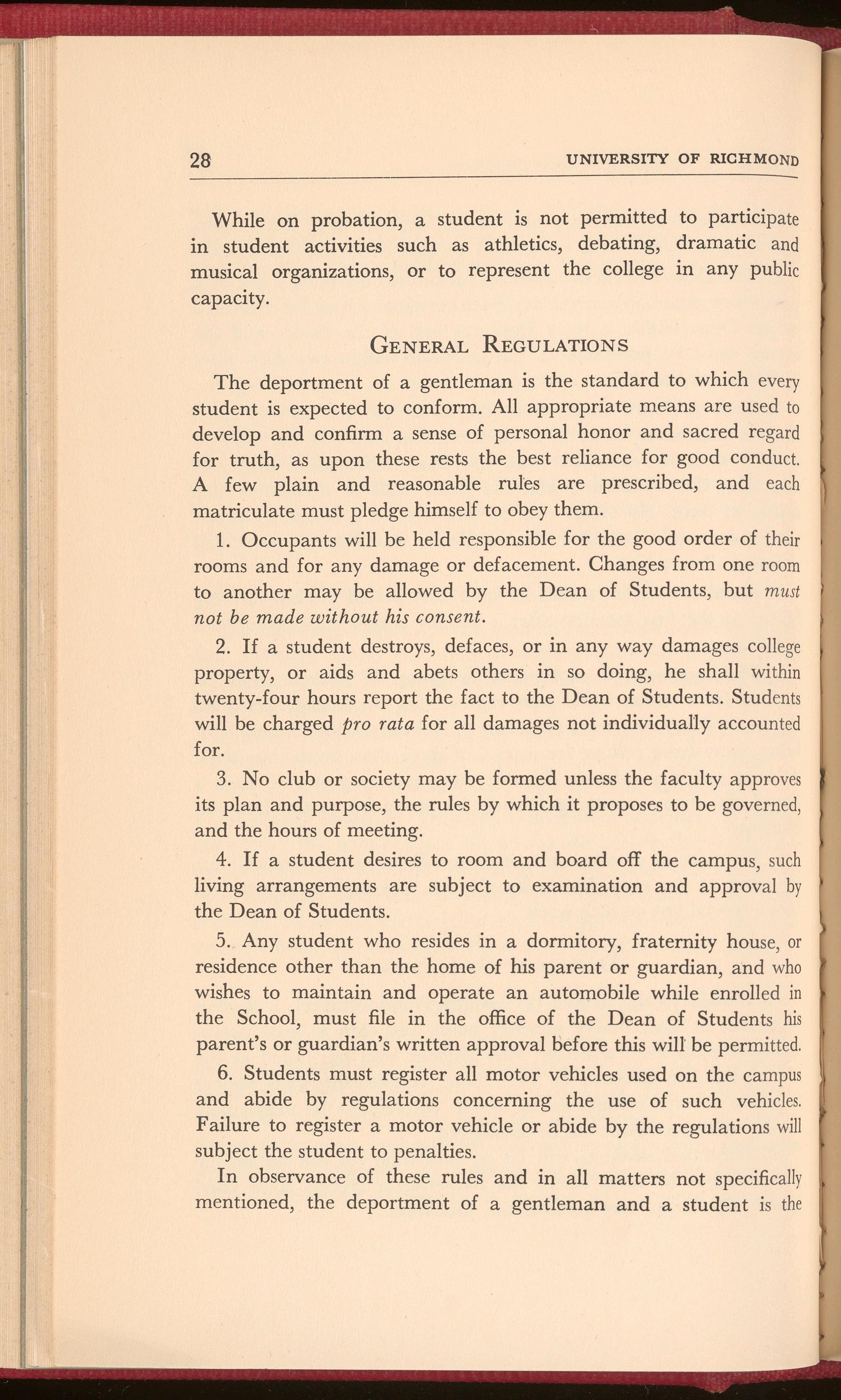
While on probation, a student is not permitted to participate in student activities such as athletics, debating, dramatic and musical organizations, or to represent the college in any public capacity.
The deportment of a gentleman is the standard to which every student is expected to conform. All appropriate means are us ed to develop and confirm a sense of personal honor and sacred re gard for truth, as upon these rests the best reliance for good condu ct. A few plain and reasonable rules are prescribed, and each matriculate must pledge himself to obey them.
1. Occupants will be held responsible for the good order of th eir rooms and for any damage or defacement. Changes from one room to another may be allowed by the Dean of Students , but mu st not be made without his cons ent.
2. If a student destroys, defaces, or in any way damages college property, or aids and abets others in so doing, he shall within twenty-four hours r eport the fact to the Dean of Students. Stud ents will be charged pro rata for all damages not individually accoun ted for.
3. No club or society may be formed unless the faculty appro ves its plan and purpose, the rules by which it proposes to be govern ed, and the hours of meeting
4. If a student desires to room and board off the campus , such living arrangements are subject to examination and approv al by the Dean of Students.
5 Any student who resides in a dormitory, fraternity hou se, or residence other than the home of his parent or guardian, and who wishes to maintain and operate an automobile while enroll ed in the School, must file in the office of the Dean of Students his parent's or guardian's written approval before this will be permitt ed.
6. Students must register all motor vehicles used on the campus and abide by regulations concerning the use of such vehicles. Failure to regist er a motor vehicle or abide by the regulations will subject the student to penalties.
In observance of these rules and in all matters not specifically mentioned, the deportment of a gentleman and a student is the
standard to which everyone is expected to conform. His sense of honor is the main reliance, and his word in matters touching his own conduct will be called for at the discretion of the Deans or President. In matriculating students, the right is reserved to require the immediate withdrawal from college of any student whenever the faculty decides that such action is desirable.
The Bachelor of Science in Business Administration is the only degree offered by the School of Business Administration. Work can be taken in the School for the degrees Master of Science in Business Administration and Master of Arts in Economics which are offered by the Graduate School of the University of Richmond.
The academic requirements for the degree are stated in semester hours, one class period per week through a semester being the unit. Quality credits are calculated from academic hours on the following basis: a semester hour passed with grade A shall count three quality credits; with grade B, two quality credits; with grade C, one quality credit; with grade D, no quality credit.
A total of 124 semester hours of work and 120 quality credits are required for the degree. At least 60 semester hours, including the work of the senior year, must be completed in the University of Richmond.
Basic Courses
Each student is required to pass with a grade of no less than C each of the following courses :
Courses
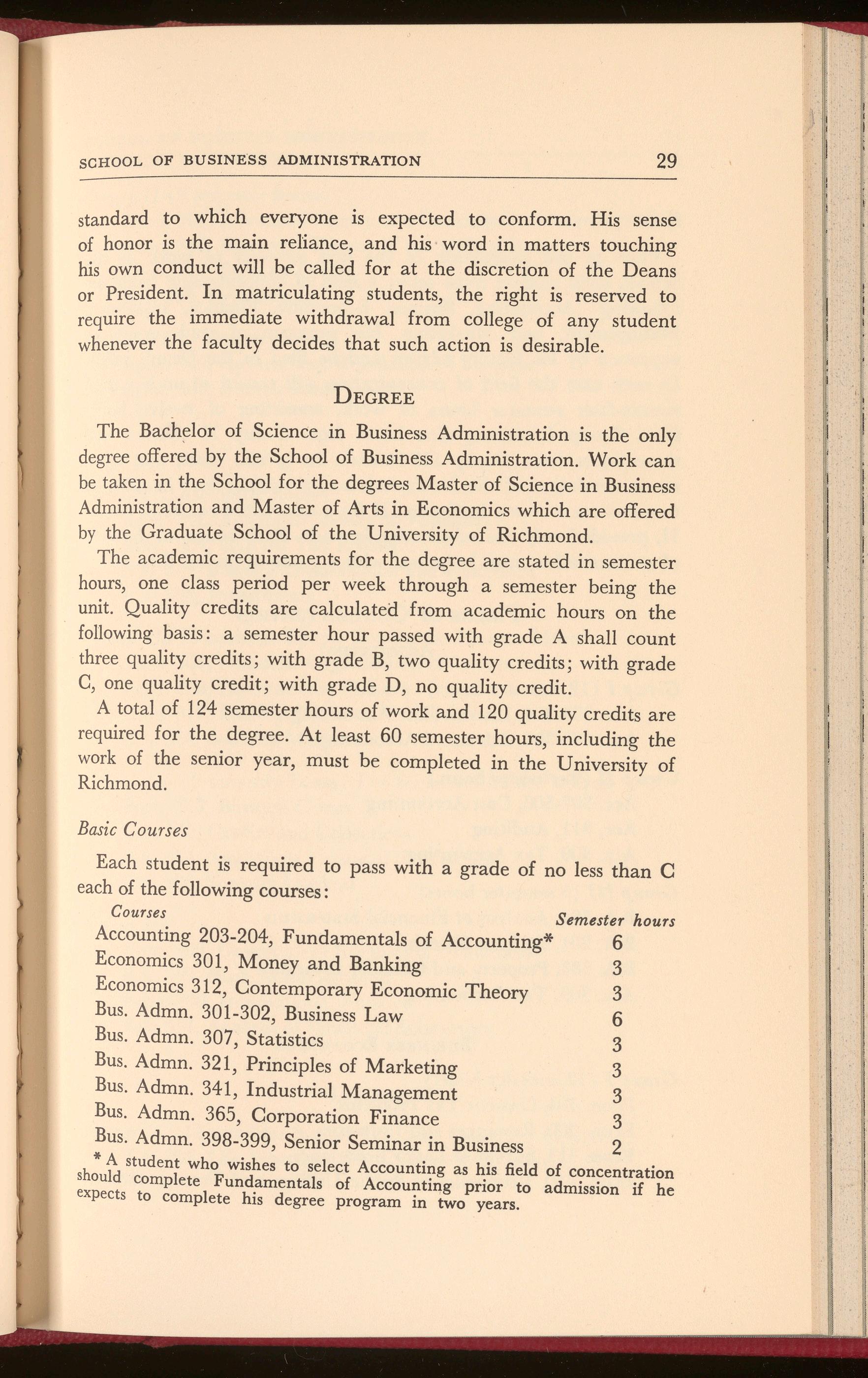
Semester hours
Accounting 203-204, Fundamentals of Accounting* 6
Economics 301, Money and Banking 3
Economics 312, Contemporary Economic Theory 3
Bus. Admn. 301-302, Business Law 6
Bus. Admn. 307, Statistics 3
Bus. Admn. 321, Principles of Marketing 3
Bus. Admn. 341, Industrial Management 3
Bus. Admn. 365, Corporation Finance 3
Bus. Admn. 398-399, Senior Seminar in Business 2
* A student who wishes to select Accounting as his field of concentration should complete Fundamentals of Accounting prior to admission if he expects to complete his degree program in two years.

Prior to the completion of the first semester of work in the School, each student must select a field of concentration from the following: Accounting, Business Economics, Finance, Insurance, Management, and Marketing. His program of study must be approved by his faculty adviser and be filed in the Dean's office. In each case the field of concentration will consist of no less than twenty-four semester hours of work, consisting of twelve hours from Group I courses, nine hours from Group II courses, and three hours from Group III courses. In special cases, and upon recommendation of the faculty advisor, a student may be allowed to substitute a course in Group III for a designated course in Group II, provided only one substitution is made. Each course in the field of concentration must be passed with a grade of no less than C.
Accou NTING
Group I ( 12 semester hours)
Acc. 303-304, Intermediate Accounting
Acc. 305-306, Advanced Accounting
Group II (9 semester hours)
Acc. 307-308, Cost Accounting
Acc. 311, Auditing
Acc. 309, Tax Accounting
Group Ill ( 3 semester hours)
B.A. 364, Analysis of Financial Statements
B.A. 201, Business Speech
B.A. 383, Property and Casualty Insurance
Acc. 309, Tax Accounting
Group I ( 12 semester hours)
Econ. 304, Current Tax Problems
Econ. 300, Resources and Industries
Econ. 313, Survey of Labor Economics
Econ. 310, Economics of Public Utilities and Transportation
Group II (9 semester hours)
Econ. 302, Advanced Money and Banking
Econ. 315, Economic History of the United States
Econ. 317, Business Cycles
B.A. 368, Investments
Group III (3 semester hours)
Econ. 309, Government Regulation of Business
Econ. 307, International Trade
Group I ( 12 semester hours)
Econ. 302, Advanced Money and Banking
Econ. 304, Current Tax Problems
B.A. 315, Business Organization and Procedure
B.A. 368, Investments
Group Ila (9 semester hours) For Public Finance Majors
Econ. 303, Financial Organization of Government
Econ. 308, International Finance
Econ. 317, Business Cycles
B.A. 366, Security Markets
Group Jib (9 semester hours) For Business Finance Majors
Econ. 317, Business Cycles
B.A. 362, Credits and Collections
B.A. 364, Analysis of Financial Statements
B.A. 366, Security Markets
Group III
Econ. 309, Government Regulation of Business
B.A. 349, Bank Administration
Econ. 308, International Finance
B.A. 364, Analysis of Financial Statements
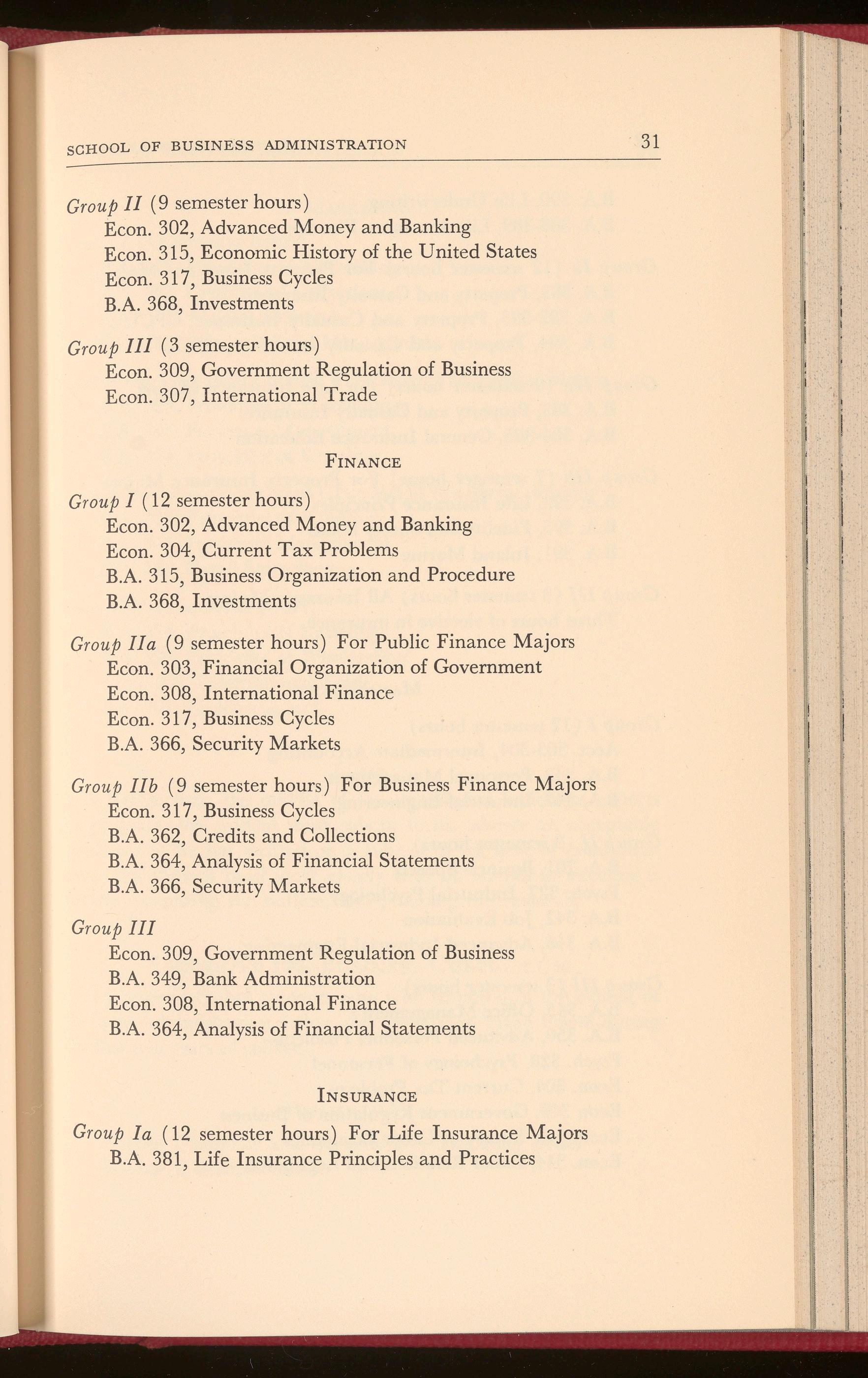
Group Ia (12 semester hours) For Life Insurance Majors
B.A. 381, Life Insurance Principles and Practices

B.A. 390, Life Underwriting
B.A. 388-389, Life Insurance Finance
Group lb (12 semester hours) For Property Insurance Majors
B.A. 383, Property and Casualty Insurance
B.A. 392-393, Property and Casualty Insurance, CPCU I
B.A 394, Property and Casualty Insurance, CPCU II
Group Ila (9 semester hours) For Life Insurance Majors
B.A. 383, Property and Casualty Insurance
B.A. 384-385, General Insurance Education
Group Jib (7 semester hours) For Property Insurance Majors
B.A. 393, Life Insurance Principles
B.A. 395, Fidelity and Surety Bonds
B.A. 391 , Inland Marine
Group Ill ( 3 semester hours) All Insurance Majors
Three hours of elective in insurance
MANAGEMENT
Group I ( 12 semester hours)
Acct. 303-304, Intermediate Accounting
B.A. 343, Personnel Management
B.A. 347, Industrial Engineering
Group II (9 semester hours)
B.A. 201, Business Speech
Psych. 327, Industrial Psychology
B.A. 342, Job Evaluation
B.A . 348, Advanced Industrial Engineering
Group Ill (3 semester hours)
B.A. 345, Office Management
B.A . 350, Advanced Personnel Problems
Psych . 328, Psychology of Personnel
Econ. 304, Current Tax Problems
Econ 309, Government Regulation of Business
Econ . 313, Survey of Labor Economics
Econ 314, Labor Relations and Legislation

Group I ( 12 semester hours)
B.A. 322, Principles of Advertising
B.A. 362, Credits and Collections
B.A. 328, Market Research
B.A. 323, Sales and Sales Management
Group Ila (9 semester hours) For General Marketing Majors
B.A. 329, Principles of Wholesaling
B.A. 343, Personnel Management
B.A. 324, Principles of Retailing
Group Ilb (9 semester hours) For Retail Marketing Majors
B.A. 324, Principles of Retailing
B.A. 343, Personnel Management
B.A. 330, Retail Store Buying
Group III (3 semester hours)
B.A. 324, Principles of Retailing
B.A. 329, Principles of Wholesaling
Econ. 307, International Trade
B.A. 201, Business Speech
Not later than the middle of the semester in which he expects to graduate , the student must submit to his adviser an acceptable thesis which he has written on a subject in his field of concentration. The student must work closely with his adviser in selecting a subject , preparing the outline, and planning the research .
It is suggested that students who wish to enroll in the School of Business Administration follow the curriculum given below during the first two years of college.
English Grammar and Composition, 6 semester hours
Science, 8 semester hours

Foreign Language, 6 semester hours
Mathematics, 6 semester hours
Social Science, 6 semester hours
English, 6 semester hours
Principles of Economics, 6 semester hours
Psychology, 6 semester hours
Public Speaking, 6 semester hours
Elective, 6 semester hours
Students who desire to take the degree in Accounting, if they expect to finish the degree work in the normal two-year period, must have completed one year of Accounting prior to entering the School of Business Administration.
The regular expenses of students residing in college dormitories, which also include room and board, amount to $815 for the college session, September to June, and are divided as follows:
All charges are payable at the Treasurer's office.
TERMS OF PAYMENT: One-half of the fees is payable on entrance , and the remaining half is payable January 15, 1951.
In making an estimate of cost for the session, the student should also take in consideration other expenses which are not paid at the Treasurer's office, such as books, laundry, and personal incidentals.
Expenses of the College Session:
*Students living in fraternity houses will receive the same medical attention and medical privileges as students living in college dormitories, and they will be charged $5.00 a session for this service, payable on entrance at the office of the University Treasurer. Because of the unsettled conditions of the cost of food, the University reserves the right to change the char~es for board for the session 1950-51.

TERMSOF PAYMENT: One-half of the fees is payable on entrance, and the remaining half is payable January 15, 1951. STUDENTSENTERINGFOR THE SECONDSEMESTERPAYONE-HALFOF THE REGULARCHARGES.
The above fees are for full-time students taking from twelve to nineteen hours inclusive per semester. The work may all be taken in the School of Business Administration or part may be taken in Richmond College.
Part-time students taking less than twelve hours will pay at the rate of $12.50 per semester hour. An additional charge of $12.50 will be made for each hour in excess of nineteen carried in any semester.
Registration fee for non-matriculated candidates for graduation ............................................................................................
Bachelor's diploma fee, payable ninety days preceding the date of graduation, not refundable
In order to avoid delay in matriculation, parents are urged to provide their sons with the amounts due on entrance. Make checks payable to University of Richmond.
The University has an arrangement with a Richmond bank whereby worthy and dependable students, who may not have sufficient funds at hand to pay all that is due the treasurer on entra nc e, may obtain short-term loans. The student himself, however, must be in a position to pay a substantial part of the amount due before the loan is approved. In addition to this, the President of the University has at his disposal several small loan funds with which to assist needy students.
* Each student is given a group of psychological tests during his first semester of attendance. The fee covers the cost of the test materials and the cost of scoring. This is a non-recurring fee.
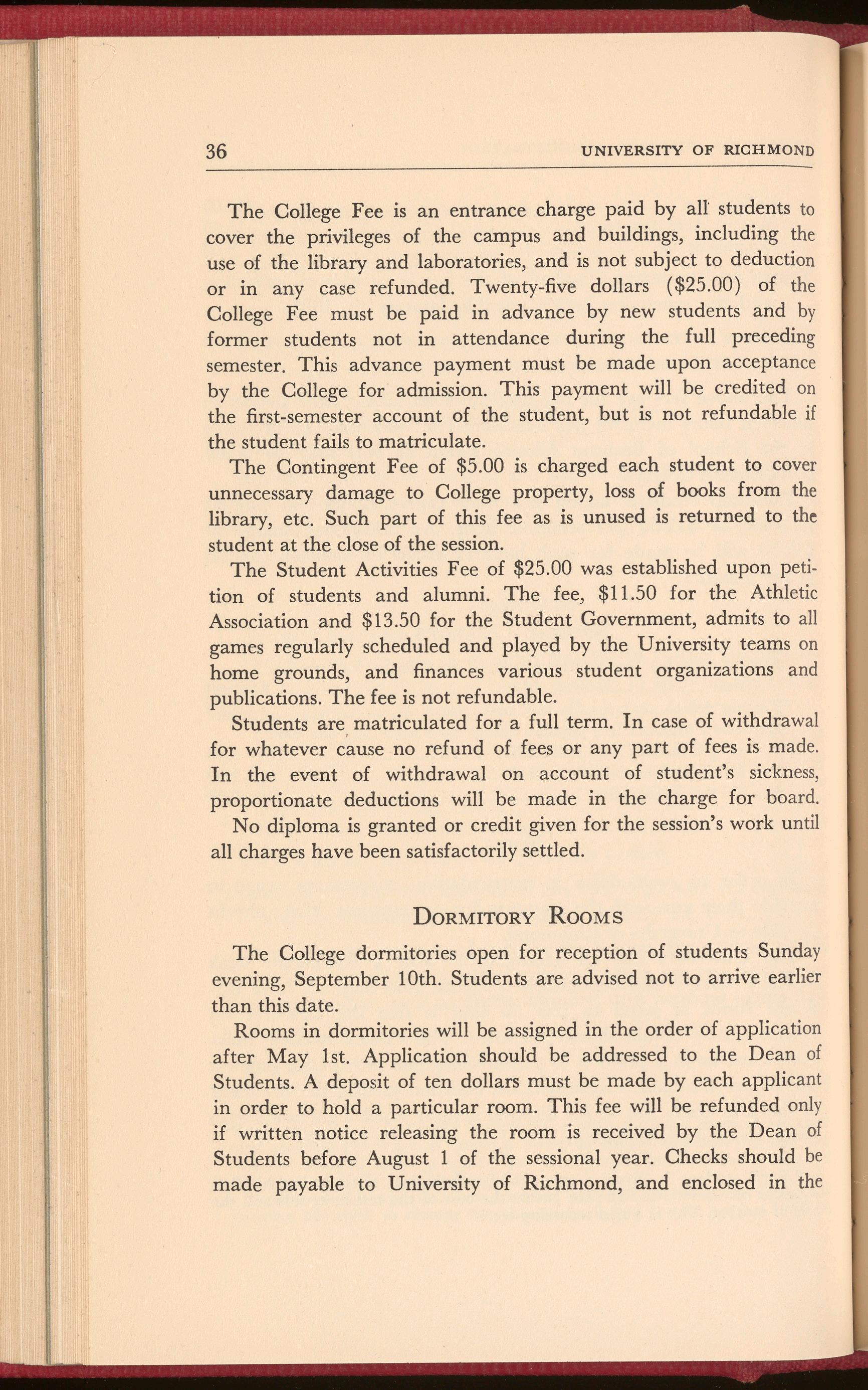
The College Fee is an entrance charge paid by all students to cover the privileges of the campus and buildings, including the use of the library and laboratories, and is not subject to deduction or in any case refunded. Twenty-five dollars ($25.00) of the College Fee must be paid in advance by new students and by former students not in attendance during the full preceding semester. This advance payment must be made upon acceptance by the College for admission. This payment will be credited on the first-semester account of the student, but is not refundable if the student fails to matriculate.
The Contingent Fee of $5.00 is charged each student to cover unnecessary damage to College property, loss of books from the library, etc. Such part of this fee as is unused is returned to the student at the close of the session.
The Student Activities Fee of $25.00 was established upon petition of students and alumni. The fee, $11.50 for the Athletic Association and $13.50 for the Student Government, admits to all games regularly scheduled and played by the University teams on home grounds, and finances various student organizations and publications. The fee is not refundable.
Students are matriculated for a full term. In case of withdrawal for whatever c~use no refund of fees or any part of fees is mad e. In the event of withdrawal on account of student's sickness, proportionate deductions will be made in the charge for board. No diploma is granted or credit given for the session's work until all charges have been satisfactorily settled.
The College dormitories open for reception of students Sunday evening, September 10th. Students are advised not to arrive earlier than this date.
Rooms in dormitories will be assigned in the order of application after May 1st. Application shoutd be addressed to the Dean of Students. A deposit of ten dollars must be made by each applicant in order to hold a particular room. This fee will be refunded only if written notice releasing the room is received by the Dean of Students before August 1 of the sessional year. Checks should be made payable to University of Richmond, and enclosed in the
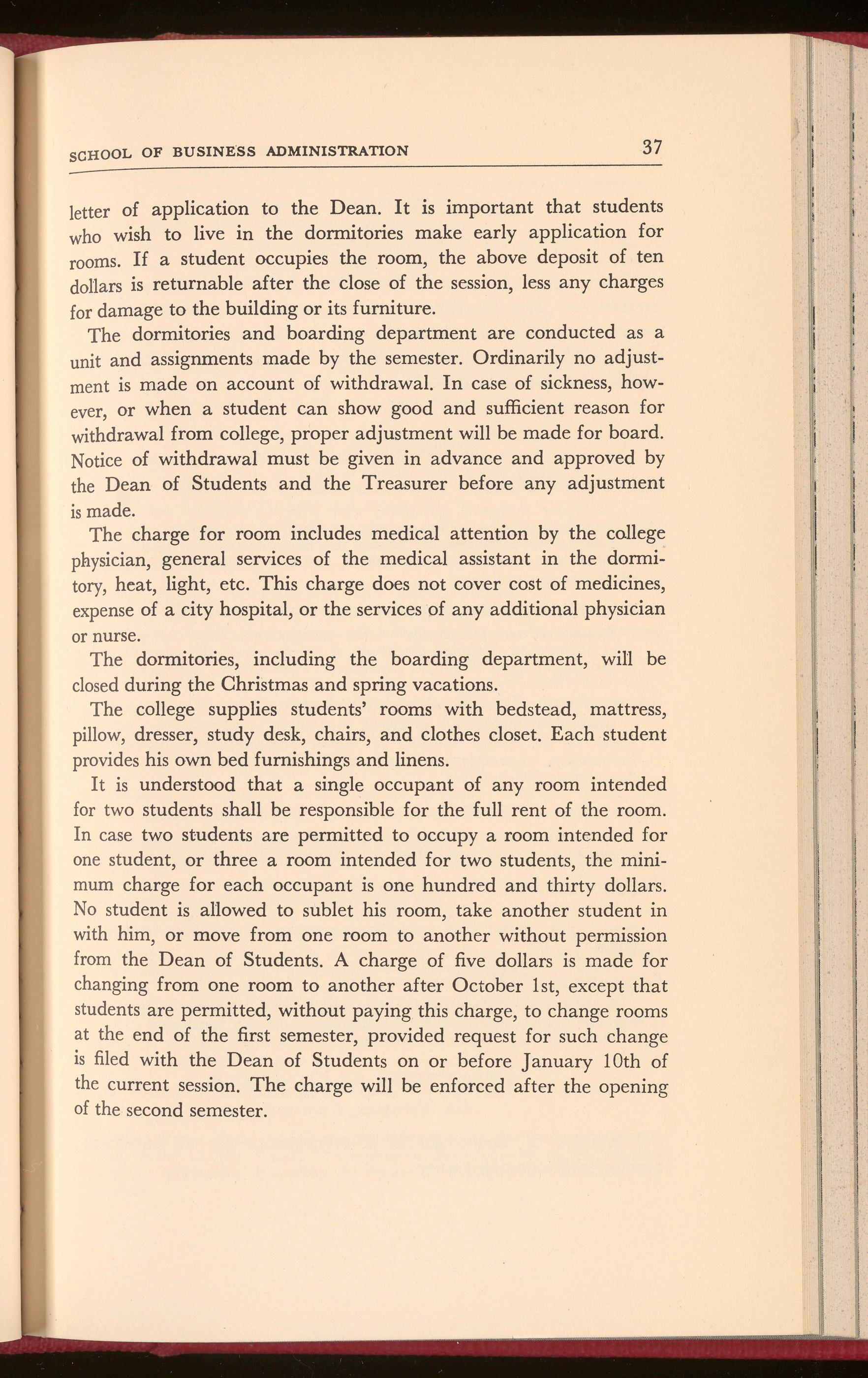
let ter of application to the Dean. It is important that students who wish to live in the dormitories make early application for rooms If a student occupies the room, the above deposit of ten dollars is returnable after the close of the session, less any charges for da mage to the building or its furniture.
The dormitories and boarding department are conducted as a unit an d assignments made by the semester. Ordinarily no adjustment is made on account of withdrawal. In case of sickness , however, or when a student can show good and sufficient reason for withdr awal from college, proper adjustment will be made for board . Notice of withdrawal must be given in advance and approved by the De an of Students and the Treasurer before any adjustment is mad e.
The charge for room includes medical attention by the college physician, general services of the medical assistant in the dormitory, he at, light, etc. This charge does not cover cost of medicines, expense of a city hospital, or the services of any additional physician or nur se.
The dormitories, including the boarding department, will be closed during the Christmas and spring vacations.
The college supplies students' rooms with bedstead, mattress, pillow, dresser, study desk, chairs, and clothes closet. Each student provides his own bed furnishings and linens.
It is understood that a single occupant of any room int ended for two students shall be responsible for the full rent of the room . In case two students are permitted to occupy a room int ended for one stud ent , or three a room intended for two students, the minimum ch a rge for each occupant is one hundred and thirty dollars No stud ent is allowed to sublet his room, take another student in with hi m , or move from one room to another without p ermission from the Dean of Students. A charge of five dollars is made for changing from one room to another after October 1st, exc ept that studen t s are permitted, without paying this charge, to change rooms at the end of the first semester, provided request for such chang e is filed with the Dean of Students on or before January 10th of the curr ent session. The charge will be enforced aft er the opening of the second semester.
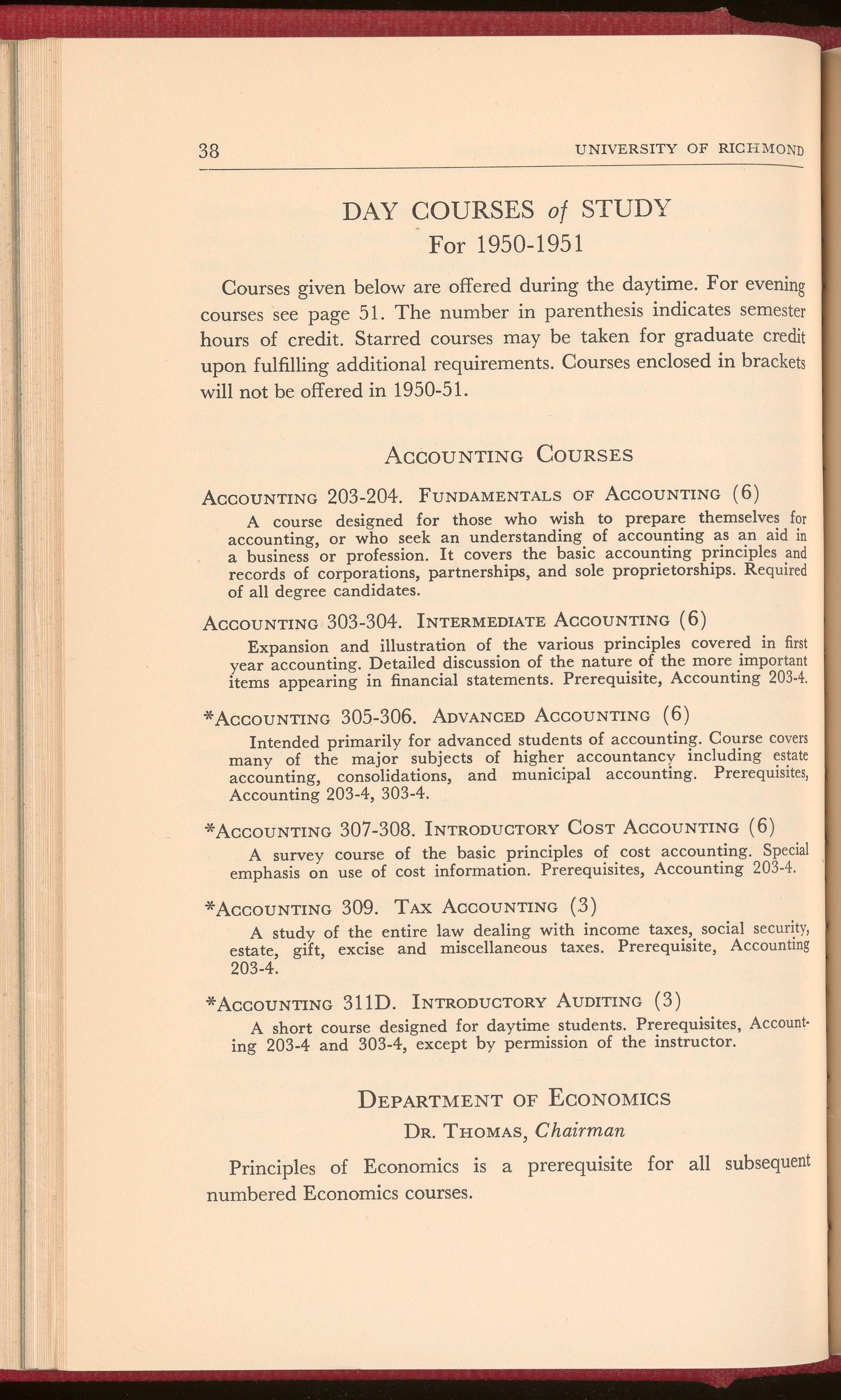
UNIVERSITYOF RICHMOND
Courses given below are offered during the daytime. For evening courses see page 51. The number in parenthesis indicates semester hours of credit. Starred courses may be taken for graduate credit upon fulfilling additional requirements. Courses enclosed in brackets will not be offered in 1950-51.
ACCOUNTING203-204. FUNDAMENTALSOF ACCOUNTING (6)
A course designed for those who wish to prepare themselves for accounting, or who seek an understanding of accounting as an aid in a business or profession. It covers the basic accounting principles and records of corporations, partnerships, and sole proprietorships. Required of all degree candidates.
AccouNTING 303-304. INTERMEDIATEAccouNTING (6)
Expansion and illustration of the various principles covered in first year accounting. Detailed discussion of the nature of the more important items appearing in financial statements. Prerequisite, Accounting 203-4.
*ACCOUNTING 305-306. ADVANCEDACCOUNTING (6)
Intended primarily for advanced students of accounting. Course covers many of the major subjects of higher accountancy including estate accounting, consolidations, and municipal accounting. Prerequisites, Accounting 203-4, 303-4.
*AccouNTING 307-308. INTRODUCTORYCosT AccouNTING (6)
A survey course of the basic principles of cost accounting. Special emphasis on use of cost information. Prerequisites, Accounting 203-4.
*ACCOUNTING 309. TAX ACCOUNTING (.3)
A study of the entire law dealing with income taxes, social security, estate, gift, excise and miscellaneous taxes. Prerequisite, Accounting 203-4.
*AccouNTING 311D. INTRODUCTORYAUDITING (3)
A short course designed for daytime students. Prerequisites, Account• ing 203-4 and 303-4, except by permission of the instructor.
DR. THOMAS, Chairman
Principles of Economics is a prerequisite for all subsequent numbered Economics courses.

EcoNOMICS 103. EvoLUTION OF INDUSTRY (3)
A survey of the origin and development of our modern economic institutions. Agricultural feudalism; guilds; mercantile capitalism; industrial capitalism; finance capitalism.
EcoNOMICS 201-202. PRINCIPLES OF ECONOMICS (6)
Fundamental economic principles. Production; value; price; distributon; wages; rent; interest; profits; business cycles; consumption economics insurance; labor; transportation; exchange; public finance; public utilities; and economic systems. Not open to freshmen. This course is a prerequisite for all subsequent Economics courses.
ECONOMICS 300. RESOURCES AND INDUSTRIES ( 3)
A study of the nature, location, and output of selected industries as affected by the supply of natural capital, and labor resources.
EcoNOMICS 301. MONEY AND BANKING (3)
An introduction to the field of money and monetary systems; credit; and the banking system of the United States. Required of all degree candidates.
*ECONOMICS 302. ADVANCED MONEY AND BANKING (3)
The study of monetary theory and banking theory. The value of money; the bank credit system; the Federal Reserve Banking System. Prerequisite, Economics 301.
*ECONOMICS 303. FINANCIAL ORGANIZATION OF GOVERNMENT (3)
Principles of public finance; public expenditures; public finance theory; shifting and incidence of taxation; budgetary procedure; distribution of the tax burden.
*ECONOMICS 304. CURRENT TAX PROBLEMS (3)
Analysis of American taxes. Income, property, business, death, and excise taxes. Public debt.
*ECONOMICS 307. INTERNATIONAL TRADE (3)
History of foreign trade. Evolution of theory of trade and prices; mercantilism; colonization; tariffs; foreign investments; balance of payments; transportation and communication.
*ECONOMICS 308. INTERNATIONAL FINANCE (3)
A study of the principles of international finance, foreign exchange, international financial relationships, currency problems and debts.
*ECONOMICS 309. GOVERNMENT REGULATION OF BUSINESS (3)
The economic bases for the regulaton of private business; the development of federal regulation of industry; the elements of sound public policy toward business.
*ECONOMICS 310. ECONOMICS OF TRANSPORTATION AND Pl.'BLIC
UTILITIES ( 3 )
An analysis of the major economic features of the transportation system of the United States. The economic characteristics of the principal utili~ies industries including methods of regulation, valuation, rate makmg.

*ECONOMICS 311. THE DEVELOPMENT OF ECONOMIC IDEAS (3)
A study of the evolution of the major economic concepts. Property; wealth; production; value; money; rent; wages.
*ECONOMICS 312. CONTEMPORARY ECONOMIC THEORY (3)
A study of the contributions of Marshall, Chamberlain, Keynes and others, to current economic theory. Required of all degree candidates.
*ECONOMICS 313. INTRODUCTION TO LABOR ECONOMICS (3)
A study of the labor force; unemployment; turnover; wages; hours; evaluation of the labor movement in the United States; aims, ideals and structure of organized labor.
*ECONOMICS 314. LABOR RELATIONS AND LEGISLATION (3)
A study of the industrial conflict; collective bargaining; labor legisla, tion; agencies and methods of promoting industrial peace.
*ECONOMICS 315. ECONOMIC HISTORY OF THE UNITED STATES (3)
A critical survey of the economic development of the United States with emphasis upon the factors and forces in economic change.
*ECONOMICS 316. COMPARATIVE ECONOMIC SYSTEMS (3)
A critical study of the systems of capitalism, communism, socialism, and others.
[*ECONOMICS 317. BUSINESS CYCLES ( 3)]
A review of the characteristics of the business cycle and various theories attempting to explain recurrent periods of prosperity and depression.
B.A. 101. INTRODUCTION TO BUSINESS (3)
A survey course offered for beginning students of Richmond College to give the student a perspective of the various phases of business The student is introduced to such activities as finance, marketing, manage• ment, statistics, accounting, labor, transportation, and insurance. Open to freshmen only.
B.A. 201. BUSINESS SPEECH (3)
This course is designed to give training in oral communications to business students. Primary emphasis is placed upon practical speech application in various business situations.
B.A. 301-302. BUSINESS LAW (6)
Introduction to nature and source of law; fundamentals of the law of contracts, property, sales, negotiable instruments, agency partnerships, corporations; application of law fundamentals to business practice. Required of all degree candidates.

B.A.315. BUSINESS ORGANIZATION AND PROCEDURE (3)
A study of the operation and management of business enterprises. The course provjdes the undergraduate student with a practical knowledge of modern business principles and techniques. Prerequisite, BA 365.
B.A.321. PRINCIPLES OF MARKETING (3)
A study of the institutions involved, functions performed, and problems encountered in getting goods and services from producers to consumers. Required of all degree candidates.
*B.A. 322. PRINCIPLES OF ADVERTISING (3)
Course covers modern principles of advertising as they relate to local and national advertising. All classes of advertising media are treated.
*B.A. 323. SALES AND SALES MANAGEMENT (3)
The practical elements of salesmanship. Designed to train salesmen, sales supervisors and sales managers.
B.A.328. MARKET RESEARCH ( 3)
This course is designed to familiarize the student with the various techniques of market and marketing research. Emphasis is placed upon actual research problems.
*B.A. 324. PRINCIPLES OF RETAILING ( 3)
This course is designed to give the student a knowledge of the various aspects of retail store organization and management.
[B.A.329. PRINCIPLES OF WHOLESALING ( 3)]
*B.A.330. RETAIL STORE BUYING (3)
A study of what, where, when to buy merchandise for the retail store, including buying techniques, buying plans, and methods of determining customer wants. Prerequisite, B.A. 324, or permission of the instructor.
B.A.341. INDUSTRIAL MANAGEMENT (3)
The course covers the field of management and provides a foundation for advanced management training. It deals with the problems of budgets, planning, policies and procedures, and industrial relations. Required of all degree candidates.
*B.A.343. PERSONNEL MANAGEMENT (3)
Student receives a realistic picture of the principles and practices. Attentio n is directed to the scope of personnel management, major factors in personnel problems, labor relations and the organization of personnel work.
B.A, 364. ANALYSIS OF FINANCIAL STATEMENTS (3)
The origin and nature of the items on a financial statement, their proper segregation, analysis, significance and relationships, together with several methods of analysis and secondary test methods.

B.A. 365. CORPORATION FINANCE (3)
Study of the development of the corporation, legal aspects, promotion methods of financing, operation of the security markets, financiJ management and others. Required of all degree candidates. Prerequisite, Accounting 203-204, or permission of the instructor.
*B.A. 368. INVESTMENTS ( 3)
The characteristics of bonds and stocks, fiduciary investments, investment banking, investment policies, security price movements, the financial page, and management of investment securities. Prerequisite, B.A. 365, or permission of the instructor.
*B.A. 318D. LIFE INSURANCE PRINCIPLES AND PRACTICES (3)
Survey of the basic principles of life insurance, the economics of life insurance, and the practices of life insurance.
*B.A. 383. PROPERTY AND CASUALTY INSURANCE (3)
A study of the contracts, laws, salesmanship, settlement of claims, reserves, rates, investment and management of fire, marine and casualty insurance.
B.A. 398-399. BUSINESS SEMINAR (2)
A required course for all seniors. Lectures by business executives and discussion of current business prnblems.
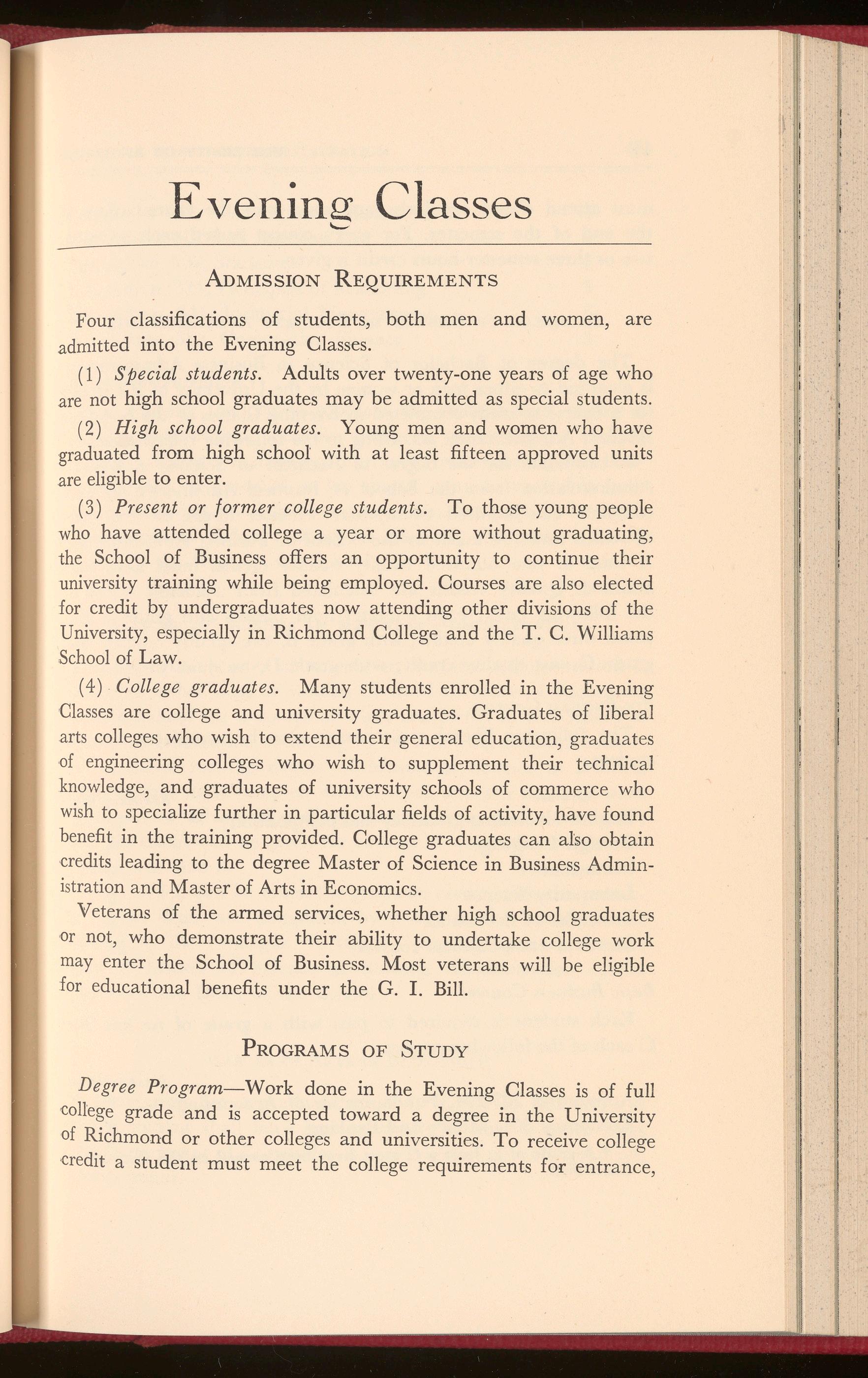
Four classifications of students, both men and women, are admitted into the Evening Classes.
( 1) Special students. Adults over twenty-one years of age who are not high school graduates may be admitted as special students.
(2) High school graduates. Young men and women who have graduated from high school with at least fifteen approved units are eligible to enter.
(3) Present or former college students. To those young people who have attended college a year or more without graduating, the School of Business offers an opportunity to continue their university training while being employed. Courses are also elected for credit by undergraduates now attending other divisions of the University, especially in Richmond College and the T. C. Williams School of Law.
(4) College graduates. Many students enrolled in the Evening Classes are college and university graduates. Graduates of liberal arts colleges who wish to extend their general education, graduates -of engineering colleges who wish to supplement their technical knowledge, and graduates of university schools of commerce who wish to specialize further in particular fields of activity, have found benefit in the training provided. College graduates can also obtain credits leading to the degree Master of Science in Business Administration and Master of Arts in Economics.
Veterans of the armed services, whether high school graduates -Ornot, who demonstrate their ability to undertake college work may enter the School of Business Most veterans will be eligible for educational benefits under the G. I. Bill.
Degree Program-Work done in the Evening Classes is of full college grade and is accepted toward a degree in the University of Richmond or other colleges and universities. To receive college credit a student must meet the college requirements for entrance,
must attend classes regularly, and must pass the examinations at the end of the semester. For every course passed each semester, two or three semester-hours credit is given.
The degree of Bachelor of Science in Business Administration is awarded to either men or women by the University of Richmond for a course of study completed in Evening Cla sses of the School of Business Administration according to the following requirements: A candidate for the degree -of Bachelor of Science in Business Administration from the School of Business Administration must complete one hundred twenty-four semester hours, at least sixty of which must be taken in the School of Business Administration . A total of one hundred twenty quality credits must have been attained . Quality credits are calculated from academic hour s on the following basis: each semester hour passed with grade A shall count three quality credits; with grade B, two quality credit s; with grade C, one quality credit; wtih grade D, no quality credit.
Pre-Business Cours es
The following liberal arts courses must be completed by each student:
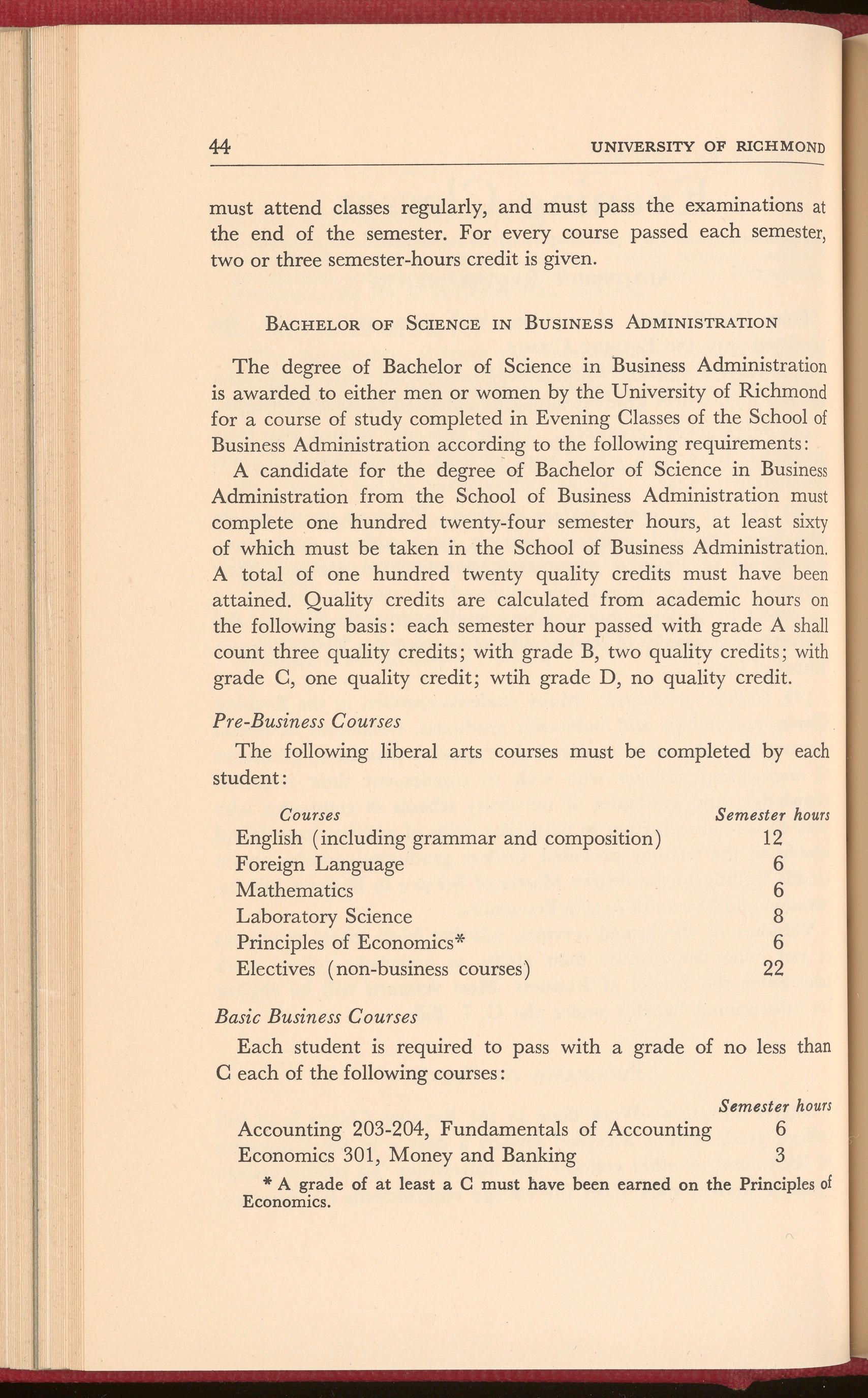
Each student is required to pass with a grade of no less than C each of the following courses:
3 * A grade of at least a C must have been earned on the Principles of
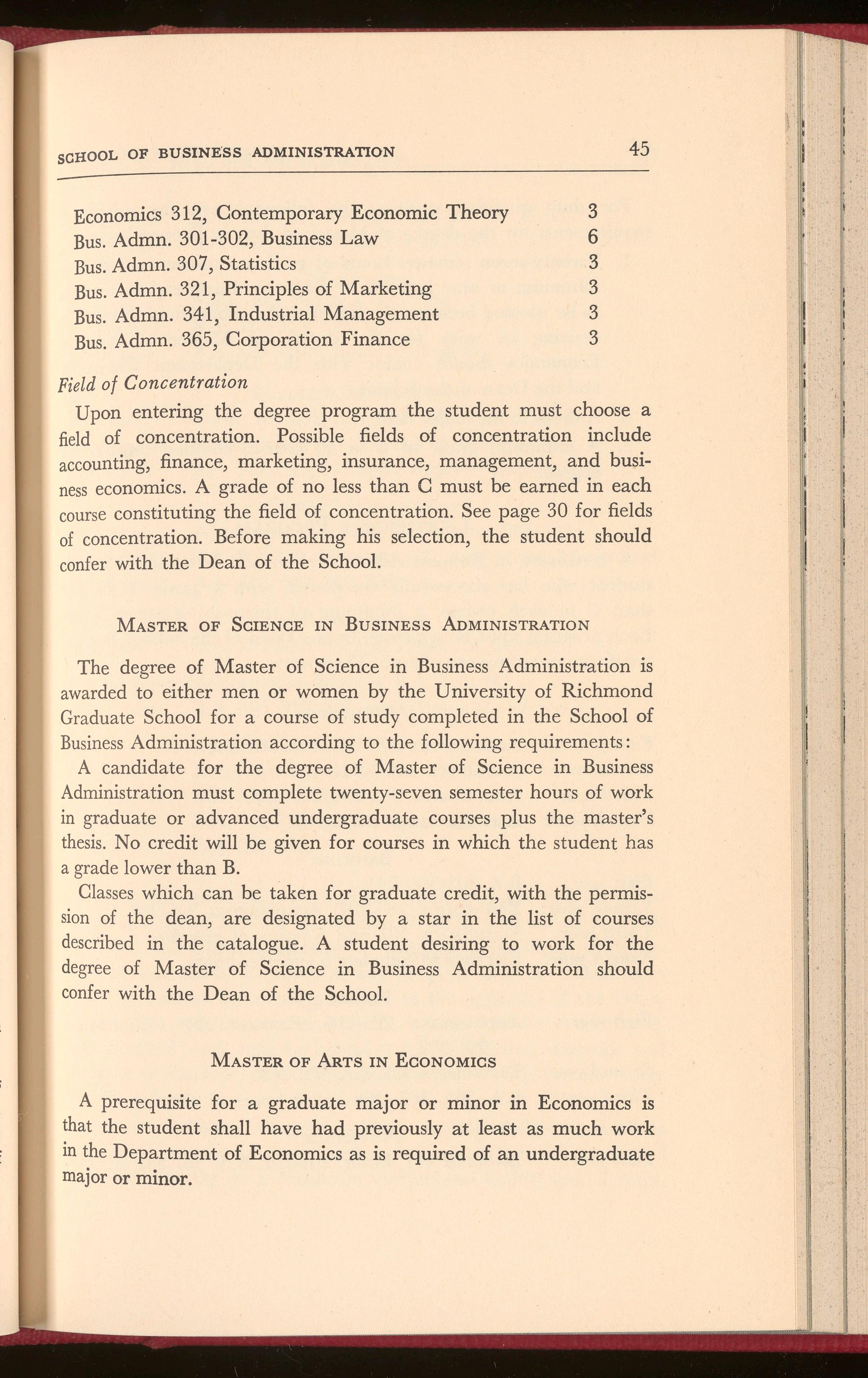
Upon entering the degree program the student must choose a field of concentration. Possible fields of concentration include accounting, finance, marketing, insurance, management, and business economics. A grade of no less than C must be earned in each course constituting the field of concentration. See page 30 for fields of concentration. Before making his selection, the student should confer with the Dean of the School.
The degree of Master of Science in Business Administration is awarded to either men or women by the University of Richmond Graduate School for a course of study completed in the School of BusinessAdministration according to the following requirements: A candidate for the degree of Master of Science in Business Administration must complete twenty-seven semester hours of work in graduate or advanced undergraduate courses plus the master's thesis. No credit will be given for courses in which the student has a grade lower than B.
Classes which can be taken for graduate credit, with the permission of the dean, are designated by a star in the list of courses described in the catalogue. A student desiring to work for the degree of Master of Science in Business Administration should confer with the Dean of the School.
A prerequisite for a graduate major or minor in Economics is that the student shall have had previously at least as much work in the Department of Economics as is required of an undergraduate major or minor.
For duly qualified students the following are the minimum requirements for the degree of Master of Arts in Economics:
1. Twenty-seven semester hours of graduate courses including a minimum of nine hours in a major field and eighteen hours to be divided between the major and a minor field. A student desiring to work for the degree of Master of Arts in Economics should confer with the Department Chairman and the Dean of the School.
2. A thesis in the major field.
3. A minimum grade of B in all courses counted toward the degree.
A certificate in Business Administration will be awarded to any student who has successfully completed, with a grade of no less than C in each course, a minimum of thirty-six semester hours, Each program must be approved by the Dean of the School. Several certificate programs are offered. These are:
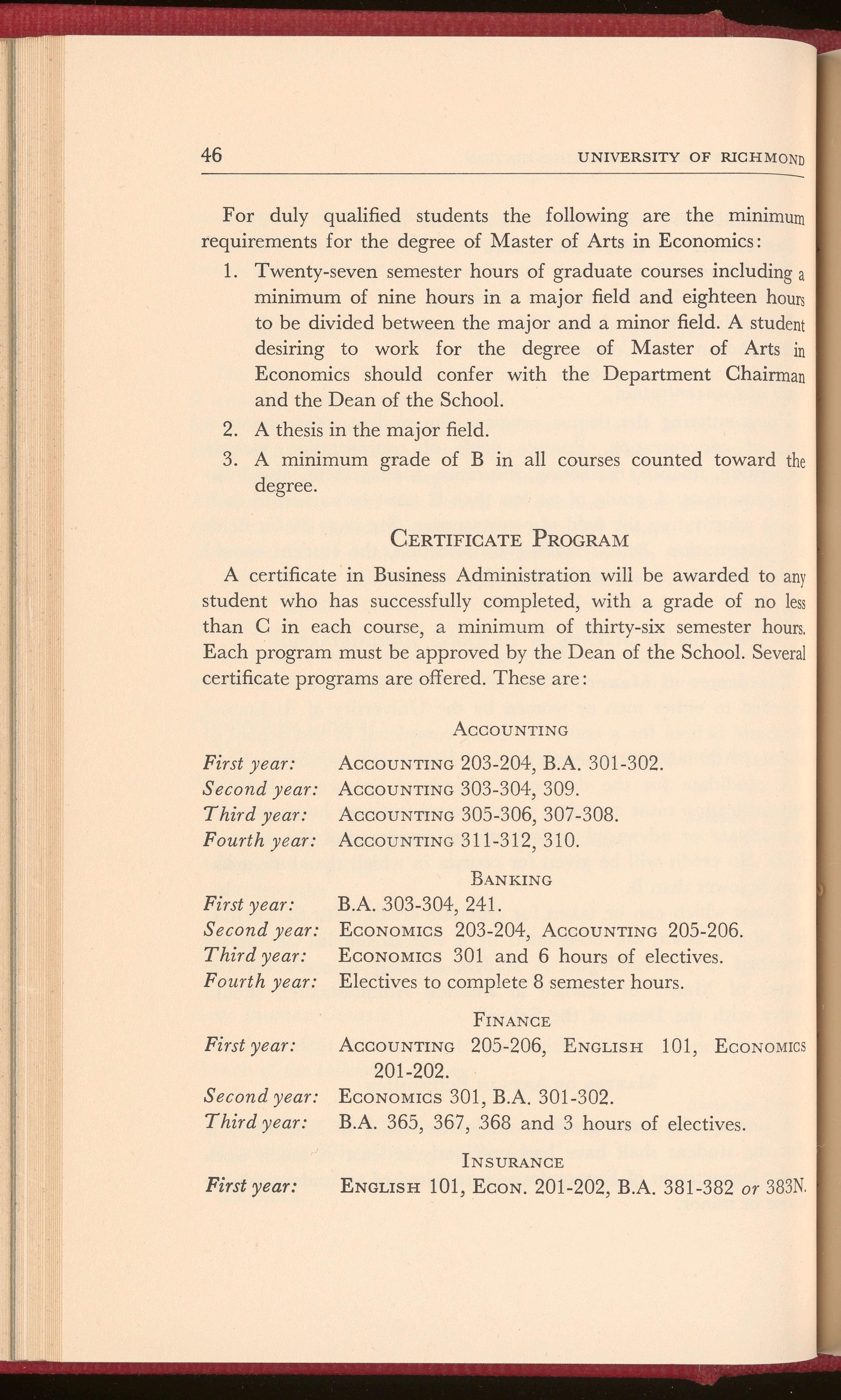
First year: Second year: Third year: Fourth year:
First year: Second year: Third year: Fourth year: First year:
Second year: Third year:
First year:
ACCOUNTING203-204, B.A. 301-302.
ACCOUNTING303-304, 309.
ACCOUNTING305-306, 307-308.
ACCOUNTING311-312, 310.
B.A. 303-304, 241.
ECONOMICS203-204, ACCOUNTING205-206.
EcoNoMICS 301 and 6 hours of electives. Electives to complete 8 semester hours.
AccouNTING 205-206, ENGLISH 101, EcoNoMrcs 201-202.
ECONOMICS301, B.A. 301-302.
B.A. 365, 367, .368 and 3 hours of electives.
ENGLISH 101, EcoN. 201-202, B.A. 381-382 or 383N.
Second year: B.A. 301-302, 384-385, 386-387 or 391. Third year: B.A. 365, 368, 388-389 or 392-393.

Firstyear: Second year: Third year:
Firstyear: Second year: Third year:
First year:
EcoN. 201-202, B.A. 321, 326.
B.A. 322, 323, 324, 327.
B.A. 328, and 9 hours of electives.
BUSINESS MANAGEMENT
EcoN. 201-202, B.A. 301-302.
ACCOUNTING203-204, B.A. 241,341.
B.A. 307, 343, 345 and 3 hours of electives.
AccouNTING 203-204, EcoNOMics 201-202.
Second year: Third year: B.A. 301-302, ENGLISH 102, and 3 hours of electives.
B.A. 362, 363, 364, 365.
First year: B.A. 301-302, 309 and 3 hours of electives.
Second year: AccouNTING 203-204, B.A. 310, 311.
Third y ear: B.A. 305, 312, 396, and 3 hours of electives.
TRANSPORTATIONANDTRAFFIC MANAGEMENT
Firstyear: EcoNOMICS 201-202, B.A. 351-352.
Second year: B.A. 321, 353-354.
Third y ear: B.A. 355-356 and 3 hours of electives. Fourth year: B.A. 357-358.
A general curriculum in Business Administration may be composed of English 101-102, Economics 201-202, Accounting 203-204, B.A. 301-302 and four electives to complete a minimum of thirtysix semester hours. Electives in any program may be chosen from other courses in the catalog, subject to the approval of the Dean. Although a specific number of years is indicated for a certificate, the r equired work may be completed in a different sequence and in more or less time, depending upon the abilities and circumstances of the student.
Individual-Course Program.-Many persons desire to enroll in individual courses for vocational or cultural value without regard to college credits or a certificate curriculum. Unless special train-
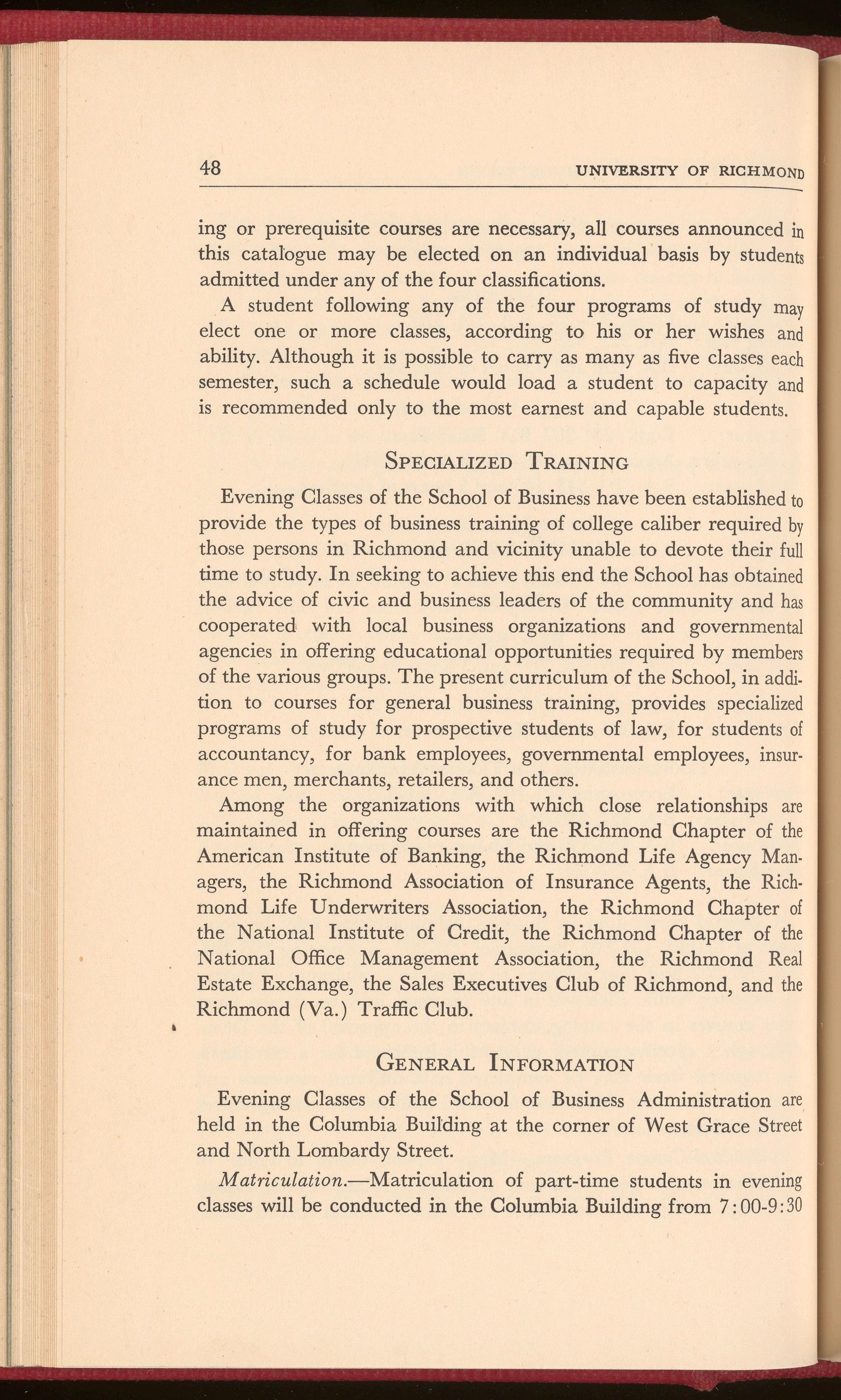
ing or prerequisite courses are necessary, all courses announced in this catalogue may be elected on an individual basis by students admitted under any of the four classifications.
A student following any of the four programs of study may elect one or more classes, according to his or her wishes and ability. Although it is possible to carry as many as five classes each semester, such a schedule would load a student to capacity and is recommended only to the most earnest and capable students.
Evening Classes of the School of Business have been established to provide the types of business training of college caliber required by those persons in Richmond and vicinity unable to devote their full time to study. In seeking to achieve this end the School has obtained the advice of civic and business leaders of the community and has cooperated with local business organizations and governmental agencies in offering educational opportunities required by members of the various groups. The present curriculum of the School, in addition to courses for general business training, provides specialized programs of study for prospective students of law, for students of accountancy, for bank employees, governmental employees, insurance men, merchants, retailers, and others.
Among the organizations with which close relationships are maintained in offering courses are the Richmond Chapter of the American Institute of Banking, the Richmond Life Agency Managers, the Richmond Association of Insurance Agents, the Richmond Life Underwriters Association, the Richmond Chapter of the National Institute of Credit, the Richmond Chapter of the National Office Management Association, the Richmond Real Estate Exchange, the Sales Executives Club of Richmond, and the Richmond (Va.) Traffic Club.
Evening Classes of the School of Business Administration are held in the Columbia Building at the corner of West Grace Street and North Lombardy Street.
M atriculation.-Matriculation of part-time students in evening classes will be conducted in the Columbia Building from 7 : 00-9: 30

p, M. Tuesday, September 5 through Friday, September 8. Evening registrations are accepted in the order received until classes are filled. No one is permitted to register for any evening class after September 29.
Class H ours.-Classes meet once each week, beginning at 7: 00 or 7: 30 P. M. and continuing for 100 or 150 minutes, unless stipulated otherwise in the description of particular courses.
Grading.-The standing of students in class work and in examinations is indicated as follows: A ( 95-100%) excellent work; B (88-94%) very good work; C (80-87%) fair or average work; D (75-79%) just passing; E and F (below 75%) indicate failure; I, incomplete because of excused absence from final examination or because of failure to submit required work during the semester; and F, failure because of excessive or unexcused absences.
Special Examinations and Removal of Incomplete Grades.-See page 23.
Withdrawals-Students are permitted to withdraw from a class without scholastic penalty prior to mid-semester upon submitting to the office of the Dean a request in writing for withdrawal. After mid-semester, withdrawals will carry the grade F. Students who stop attending class without notifying the office of the Dean will receive the grade F regardless of when attendance was stopped.
Absences.-No credit can be given for a course if, during a semester, the student has more than four absences, whether excused or unexcused and including those caused by entering the course late, unless the instructor indicates in writing to the dean that he believes the student is sufficiently qualified to be allowed credit for the course. Unexcused absences should result in an appropriate lowering of the student's grade, to be determined by the instructor. The grounds for excusing absences are ( 1) illness, ( 2) a personal obligation recognized as valid by the instructor, and ( 3) religious holidays.
Vocational Counseling and Placement of Students.-To help students find the vocation for which they are best suited, members of the staff of the University of Richmond will conduct vocational aptitude tests which may be taken by students registered in Evening classes. The results of these scientific tests, combined with individual discussions with students, will be used as the basis for
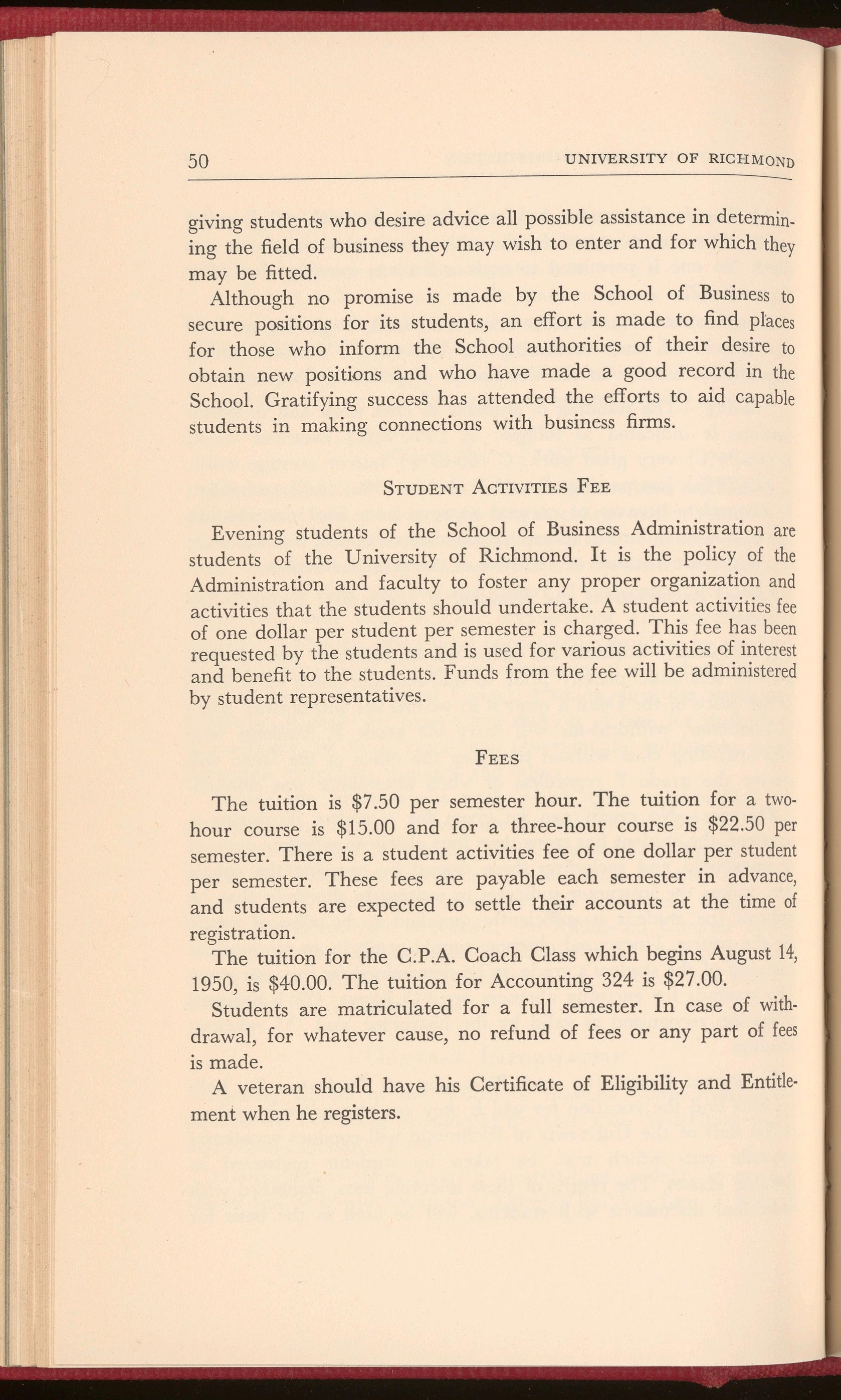
UNIVERSITY OF RICHMOND
giving students who desire advice all possible assistance in determining the field of business they may wish to enter and for which they may be fitted.
Although no promise is made by the School of Business to secure positions for its students, an effort is made to find places for those who inform the School authorities of their desire to obtain new positions and who have made a good record in the School. Gratifying success has attended the efforts to aid capable students in making connections with business firms.
Evening students of the School of Business Administration are students of the University of Richmond. It is the policy of the Administration and faculty to foster any proper organization and activities that the students should undertake. A student activities fee of one dollar per student per semester is charged. This fee has been requested by the students and is used for various activities of interest and benefit to the students. Funds from the fee will be administered by student representatives.
The tmt10n is $7.50 per semester hour. The twt10n for a twohour course is $15.00 and for a three-hour course is $22.50 per semester. There is a student activities fee of one dollar per student per semester. These fees are payable each semester in advance, and students are expected to settle their accounts at the time of registration.
The tuition for the C.P.A. Coach Class which begins August 14, 1950, is $40.00. The tuition for Accounting 324 is $27.00.
Students are matriculated for a full semester. In case of withdrawal, for whatever cause, no refund of fees or any part of fees is made.
A veteran should have his Certificate of Eligibility and Entitlement when he registers.

The right is reserved to withdraw courses in which the enrollment is less than fifteen. Classes will be closed as soon as maximum enrollment is reached. Starred courses may be taken for graduate credit upon fulfilling additional requirements. For a description of courses with (D) following the title, see the section on day courses. Courses enclosed in brackets will not be offered during the 1950-51 session. The schedule of days on which Evening Classesmeet may be secured by telephoning 6-9485 or writing to the Office.
AccouNTING 203-204. FUNDAMENTALS OF AccouNTING (D)
7:00-9:30, both semesters. Six hours credit.
AccouNTING 205-206. GENERAL AccouNTING [AIB]
7:00-9:30, both semesters. Six hours credit.
Course content is similar to Accounting 203-204, but designed to meet needs of banking students. Not open to degree candidates.
AccouNTING 203. FUNDAMENTALS OF AccoUNTING (D)
7:00-9:30, second semester. When followed by Accounting 204, six semester hours of credit.
AccouNTING 204. FUNDAMENTALS OF AccouNTING (D)
7:00-9:30, first semester. Six hours credit. Prerequisite, Accounting 203.
AccouNTING 303-304. INTERMEDIATE AccouNTING (D)
7:00-9:30, both semesters. Six hours credit.
*AccouNTING 305-306. ADVANCED AccouNTING (D)
7:00-9:30, both semesters. Six hours credit.
* AccouNTING 307-308. CosT AccouNTING
7:00-9:30, both semesters. Six hours credit.
Covers methods of accounting for the various elements of production, distribution, and financial costs, with special emphasis on the use of cost information Prerequisite, Accounting 203-4, 303-4
*ACCOUNTING 309. TAX ACCOUNTING (D)
7:00-9:30, first semester. Three hours credit.
UNIVERSITY OF RICHMOND
*AccouNTING 310. GovERNMENTAL AND FUND AccoUNTING 7:00-9:30, second semester. Three hours credit.
Intended primarily for C.P.A. candidates and those engaged in financial departments of gover;11ment, the course covers the basic principles of govern~ent accountmg a_t a)! l~vels as well as accounting principles as applied to non-profit mst1tut10ns.
*AccoUNTING 311-312. AumTING
7:00-9:10, both semesters. Four hours credit.
Auditing procedure covere~ in_ the vario_us t)1)eS ?f audit, c~nsidera. tion of special types of exammat10ns, and 1;11vest1gat10ns,and discussion of ethics and general conduct of the public accountant. Prerequisites Accounting 203-4 and 303-4, except by permission of the instructor. '
[AccouNTING 313-.314. AccouNTING SYSTEMS (6)]
AccoUNTING
No credit.
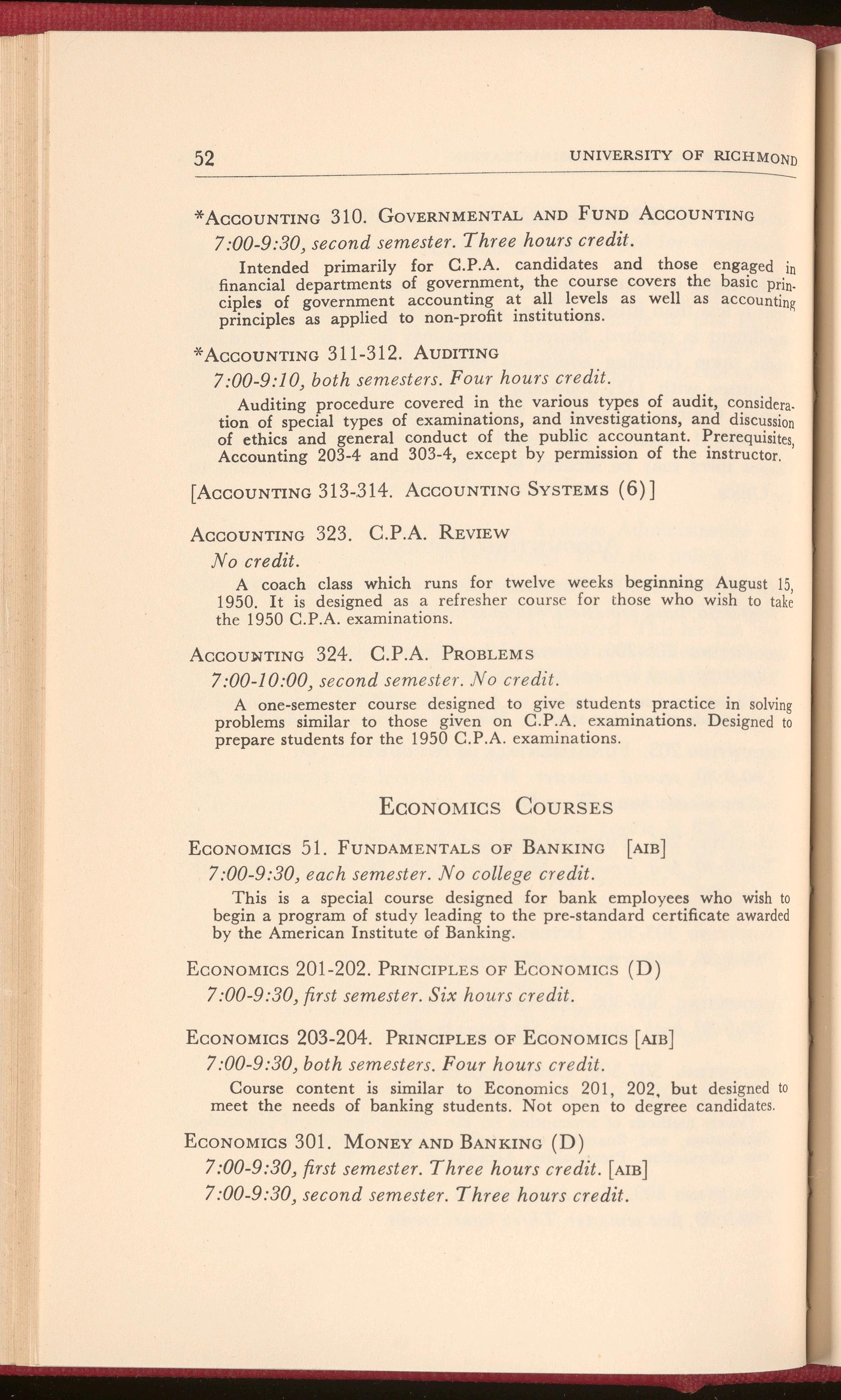
323. C.P.A. REvrnw
A coach class which runs for twelve weeks beginning August 15 1950. It is designed as a refresher course for those who wish to tak~ the 1950 C.P.A. examinations.
Accou:wTING 324. C.P A. PROBLEMS
7:00-10:00, second sem ester . No credit.
A one-semester course designed to give students practice in solving problems similar to those given on C.P.A examinations. Designed to prepare students for the 1950 C.P.A. examinations.
ECONOMICS COURSES
ECONOMICS 51. FUNDAMENTALS OF BANKING [Arn]
7:00-9:30, each semester. No college credit.
This is a special course designed for bank employees who wish to begin a program of study leading to the pre-standard certificate awarded by the American Institute of Banking.
ECONOMICS 201-202. PRINCIPLES OF ECONOMICS (D)
7 :00-9 :30, first semester. Six hours credit.
ECONOMICS 203-204. PRINCIPLES OF ECONOMICS [Arn]
7:00-9:30, both semesters. Four hours credit.
Course content is similar to Economics 20 I, 202, but designed to meet the needs of banking students. Not open to degree candidates.
ECONOMICS 301. MONEY AND BANKING (D)
7:00-9:30, first semester. Three hours credit. [Arn]
7:00-9:30, second semester. Three hours credit.

*EcoNoMICS 307. INTERNATIONAL TRADE (D)
7:00-9:30, second semester. Three hours credit.
*EcoNOMICS 317. Bus1NESS CYCLES
7:00-9:30, second semester. Three hours credit.
A review of the characteristics of the business cycle and various theories attempting to explain recurrent periods of prosperity and depression.
B.A. 201. BUSINESS SPEECH
7:00-9:30, each semester. Three hours credit.
This course is designed to develop poise and self-confidence in speaking to groups or in personal contacts.
B.A. 301-302. BUSINESS LAW (D)
7:00-9:30, both semesters. Six hours credit.
B.A. 303. CoMMERCIAL LAW [Arn]
7:00-9:30, each semester. Three hours credit.
A study of the fundamental principles of law from the standpoint of banking and commerce. Subjects covered are contracts, agency, partnerships, corporations, sales, estates, trusts, et cetera. Not open to degree candidates.
B.A. 304. NEGOTIABLE INSTRUMENTS [Arn]
7:00-9:30, second semester. Three hours credit.
A continuation of Commercial Law which covers the form and interpretation of negotiable paper, the right of a holder in due course, negotiation, liability, acceptances, et cetera. Not open to degree candidates.
[B.A. 305. LAW OF REAL AND PERSONAL PROPERTY (3)]
*B.A. 306. LABOR LA w
7:00-9:30, second semester. Three hours credit.
Federal and State statutory law and common law governing relations between employer and employee. Special emphasis is placed on current laws.
B.A. 307. STATISTICS
7:00-9:30, second semester. Three hours credit.
Construction, use and interpretation of statistical tables, charts, diagrams, indexes, deviation curves and correlation with special emphasis on uses in business. Required of all degree candidates. Prerequisite, college algebra, or permission of the instructor.
B.A. 308. BUSINESS MATHEMATICS
7:00-9:30, second semester. Three hours credit.
Ma!hematics of business finance with special emphasis on annuities, amo_rtlzations, sinking funds, depreciation, bonds, and actuarial mathematics. Prereq1tisite, college algebra, or permission of the instructor.

UNIVERSITY OF RICHMOND
[B.A. 309. PRINCIPLES OF REAL ESTATE (3)]
[B.A. 310. REAL ESTATE BROKERAGE (3)]
[B.A. 311. REAL ESTATE APPRAISAL (3)]
[B.A. 312. PROPERTY MANAGEMENT (3)]
*B.A. 314. PRINCIPLES OF PUBLIC RELATIONS
7:00-9:30, second semester. Three hours credit.
The basic principles and procedures involved in a. sound public relations program with emphasis on selection of media and proper preparation of publicity releases.
B.A. 321. PRINCIPLES OF MARKETING (D)
7:00-9:30, first sem ester. Three hours credit.
·*B.A. 322. PRINCIPLES OF ADVERTISING (D)
7:00-9:30, first semester. Three hours credit.
*B.A. 324. PRINCIPLES OF RETAILING (D).
7 :00-9:30, second semester. Three hours credit
B.A. 325 . RETAIL SALESMANSHIP
7:00-9:30 , first semester. Three hours credit.
A study of the principles involved in helping the retail customer satisfy his buying needs. Practical demonstrations and visual aids are used to help the student.
B.A. 326. SALESMANSHIP
7:00-9:30, second semester. Three hours credit.
A study of the principles involved in personal selling other than retail selling. Special emphasis on developing territories, prospecting, buying motives, presentations, sales tools, closing the sale, et cetera.
*B.A. 327. SALES MANAGEMENT
7 :00-9:30, second semester. Three hours credit.
An advanced course for sales supervisors, and managers which covers organization, recruiting, selection and training of salesmen, compensation, su~ervision, territories, expeases, quotas, et cete -ra. Prerequisit e, sales experience and permission of the instructor.
*B.A. 328. MARKET RESEARCH
7:00-9:30, second semester. Three hours credit
Designed for advanced students of marketing interested in techniques of market and marketing research. Prerequisite B.A. 307 and 321.

B.A.241. BusINEss MANAGEMENT [Arn]
7:00-9:30, first semester. Three hours credit.
An introductory course designed for banking students which covers the organization, functions and operations of a business enterprise. Each phase of business activity is examined. Not open to degree candidates.
B.A 242. SMALL BUSINESS MANAGEMENT
7:00-9:30, first semester. Three hours credit.
An analysis of the various problems involved in organizing and operating a small business with special emphasis on kind of business, location, record keeping, merchandising, personnel, legal obligations and over-all management.
B.A. 341. INDUSTRIAL MANAGEMENT (D)
7:00-9:30, second semester. Three hours credit.
*B.A. 342. JoB EvALUATION
7:00-9:30, first semester. Three hours credit.
The needs and purposes of job evaluation, proper procedures for evaluation in regard to manpower requirements and the rating of jobs to determine equitable compensation.
*B.A.343. PERSONNEL MANAGEMENT (D)
7:00-9:30, first semester. Three hours credit.
*B.A. 344. SUPERVISOR TRAINING
7:00-9:30, second semester. Three hours credit.
A course designed to train foremen and supervisors in the basic principles of leadership and modern techniques in supervising workers in order to achieve maximum efficiency with high employee morale.
*B.A. 345. OFFICE MANAGEMENT
7:00-9:30, first semester. Three hours credit.
A study of the principles, methods and general practices of office operations which are adaptable to both large and small offices with emphasis on duties and responsibilities of the manager, layout, equipment, forms, costs, budgets, selection and training of personnel, manuals, et cetera.
*B.A. 346. OFFICE METHODS
7:00-9:30, first semester. Three hours credit.
The development and application of work simplification techniques to the non-productive processes of the business organization; proper layout, flow of work, standard operations and procedures.
*BA. 347. INDUSTRIAL ENGINEERING
7:00-9:30, first semester. Three hours credit.
A study of the improvement of methods and elimination of waste through time study, job evaluation, operator training and standard costs.

UNIVERSITY OF RICHMOND
*B.A. 348. ADVANCED INDUSTRIAL ENGINEERING
7:00-9:30, second semester. Three hours credit.
Micromotion study, principles of motion economy, methods time measurement and determination of time standards. Prerequisite, B.A. 347, or its equivalent.
·*B.A. 349. BANK ADMINISTRATION [Am]
7:00-9:30, second semester. Three hours credit.
An advanced course for banking personnel which covers personnel policies, budgetary control, audits and examina tions, insurance and taxation, business development and advertising policies.
*B.A. 350. ADVANCED PERSONNEL PROBLEMS
7:00-9:30, second semester. Three hours credit.
An advanced course designed to examine thoroughly the leading personnel problems involved in everyday operations of business Pre• requisite, B.A. 343, or its equivalent.
B.A. 351-352. INTRODUCTION TO TRAFFIC MANAGEMENT
7:00-9:30, both semesters. Six hours credit .
This course includes an analysis of the American transportation system, developments leading to the regulation of railroads and other earners, origin and development of classification and rate territories, principles of freight classification and an analysis of classification rules.
B.A. 353-354. INTERMEDIATE TRAFFIC MANAGEMENT
7:00-9:30, both semesters. Six hours credit.
The application of tariff circulars, construction and filing of tariffs ( tariff compilation), freight rates and tariffs, routing and special freight services. Prerequisite, B.A. 351-352.
*B.A. 355-356. ADVANCED TRAFFIC MANAGEMENT
7:00-9:30, both semesters. Six hours credit.
This course analyzes from a legal standpoint tariff and rate interpretation, through routes and rates, application of arbitraries and differentials , milling-in-transit rates, import and export traffic and rates. Rate and classification committee procedures are outlined. Prerequisite, B.A. 353-354, or permission of the instructor.
·*B.A. 357-358. PRACTICE AND PROCEDURE BEFORE I.C.C.
7 :00-9:30, both semesters. Six hours credit.
This course is designed to prepare the student to become a practitioner before the I.C.C. Special attention is given to application of the Interstate Commerce Act, rules of practice, evidence, leading Supreme Court decision and the code of ethics. Prerequisite, B.A. 355 -356, or permission of the instructor.
·X-B.A. 498-499. GRADUATE SEMINAR IN BUSINESS
7:00-9:30, both semesters. Six hours credit.
This course is required of all students working for the degree Master of Science in Business Administration. Subject matter to be covered will depend upon the interests and fields of concentration of the class members. Prerequisite: A baccalaureate degree and permission of the the Dean.
SCHOOL OF BUSINESS ADMINISTRATION
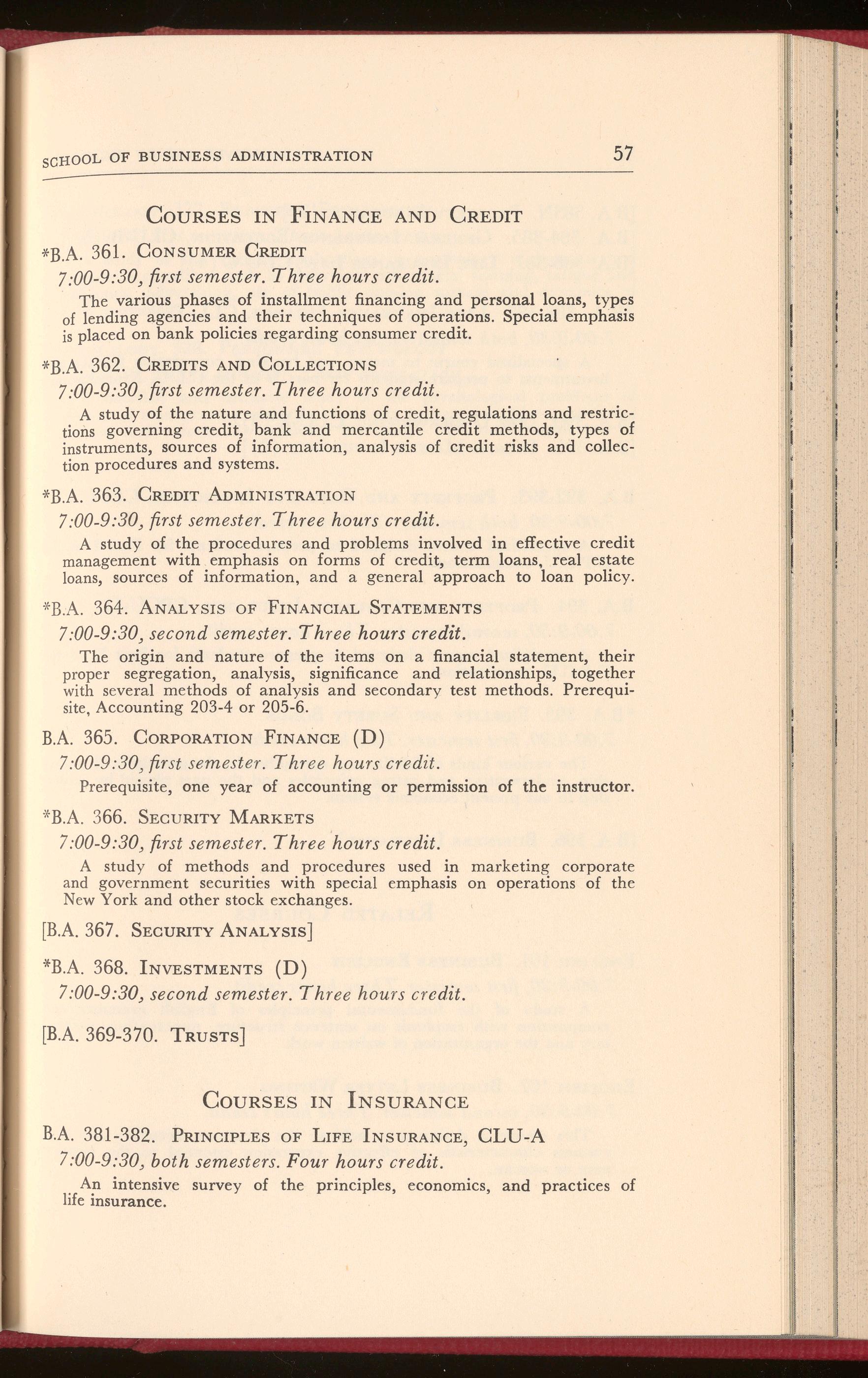
IN
*B.A. 361. CONSUMER CREDIT
7:00-9:30, first semester. Three hours credit.
The various phases of installment financing and personal loans, types of lending agencies and their techniques of operations. Special emphasis is placed on bank policies regarding consumer credit.
*B.A.362. CREDITS AND COLLECTIONS
7:00-9:30, first semester. Three hours credit.
A study of the nature and functions of credit, regulations and restrictions governing credit, bank and mercantile credit methods, types of instruments, sources of information, analysis of credit risks and collection procedures and systems.
*B.A.363. CREDIT ADMINISTRATION
7:00-9:30, first semester. Three hours credit.
A study of the procedures and problems involved in effective credit management with emphasis on forms of credit, term loans, real estate Joans, sources of information, and a general approach to loan policy.
*B.A. 364. ANALYSIS OF FINANCIAL STATEMENTS
7:00-9:30, second semester. Three hours credit.
The origin and nature of the items on a financial statement, their proper segregation, analysis, significance and relationships, together with several methods of analysis and secondary test methods. Prerequisite, Accounting 203-4 or 205-6.
B.A. 365. CORPORATION FINANCE (D)
7:00-9:30, first semester. Three hours credit.
Prerequisite, one year of accounting or permission of the instructor.
*B.A 366. SECURITY MARKETS
7:00-9:30, first semester. Three hours credit.
A study of methods and procedures used in marketing corporate and government securities with special emphasis on operations of the New York and other stock exchanges.
[B.A.367. SECURITY ANALYSIS]
*B.A. 368. INVESTMENTS (D)
7:00-9 :30, second semester. Three hours credit.
[B.A.369-370. TRUSTS]
B.A. 381-382. PRINCIPLES OF LIFE INSURANCE, CLU-A
7:00-9:30, both semesters. Four hours credit.
An intensive survey of the principles, economics, and practices of life insurance.
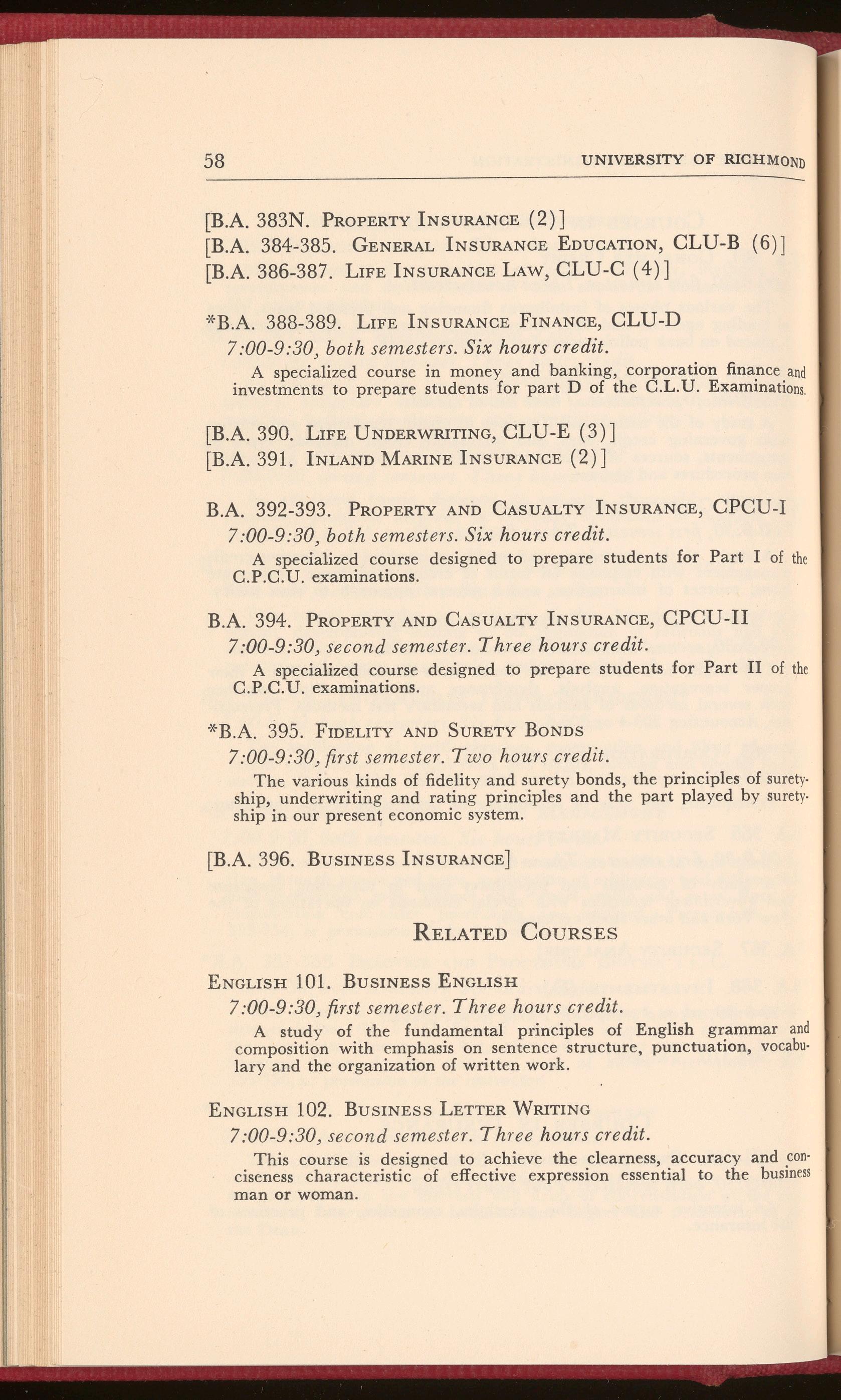
[B.A, 383N. PROPERTY INSURANCE (2)]
[B.A. 384-385. GENERAL INSURANCE EDUCATION, CLU-B (6)]
[B.A. 386-387. LIFE INSURANCE LAW, CLU-C (4)]
,'tB.A. 388-389. LIFE INSURANCE FINANCE, CLU-D 7 :00-9 :30, both semesters. Six hours credit.
A specialized course in money and banking, corporation finance and investments to prepare students for part D of the C.L.U. Examinations .
[B.A. 390. LIFE UNDERWRITING, CLU-E (3)]
[B.A. 391. INLAND MARINE INSURANCE (2)]
B.A. 392-393. PROPERTY AND CASUALTY INSURANCE, CPCU-I 7:00-9:30, both semesters. Six hours credit.
A specialized course designed to prepare students for Part I of the C.P.C.U. examinations.
B.A. 394. PROPERTY AND CASUALTY INSURANCE, CPCU-II 7:00-9:30, second semester. Three hours credit.
A specialized course designed to prepare students for Part II of the C.P.C.U. examinations.
·*B.A. 395. FIDELITY AND SURETY BONDS
7:00-9:30, first semester. Two hours credit.
The various kinds of fidelity and surety bonds, the principles of surety. ship, underwriting and rating principles and the part played by surety• ship in our present economic system.
[B.A. 396. BUSINESS INSURANCE]
ENGLISH 101. BUSINESS ENGLISH
7:00-9:30, first semester. Three hours credit.
A study of the fundamental principles of English grammar and composition with emphasis on sentence structure, punctuation, vocabulary and the organization of written work.
ENGLISH 102. BUSINESS LETTER WRITING
7:00-9:30, second semester. Three hours credit.
This course is designed to achieve the clearness, accuracy and con· ciseness characteristic of effective expression essential to the business man or woman.

s cFIOOL OF BUSINESS ADMINISTRATION
* P SYCHOLOGY 327 BUSINESS PSYCHOLOGY
7:00-9:30, first semester. Three hours credit.
A study of the various applications of psychology in business and industrial situations such as individual differences, trainin g , fatigue and efficiency, advertising, use of public opinion surv e ys and dynamics of mob psychology.
* P SYCHOLOGY 328. PERSONNEL PSYCHOLOGY
7:00-9:30, second semest er. Three hou rs credit.
A detailed and intensive stud y of the psychological probl e ms of personnel management with emphasis tests, ratin g s, inc e ntiv e s, emotional factors and morale. Prerequisite, Psycholog y 327 , or its equival ent
SCHOLARSHIPS AWARDED, JUNE 1949
ROBERT J. GAMBILL
BERTHA RoEDER GooDMAN
CHARLES WILBUR EVANS, JR.
CHARLES ELWOOD MERVINE, JR. . Accounting J
Business En glish Business Law Effective Sp eaking
T. COLEMAN ANDREWS AND COMPANY PRIZE IN AccouNTING
CARLEE. DAVIS
LIFE AGENCY MANAGERS PRIZE IN LIFE INSURANC E
JAMES S. DUDLEY, JR.
SALES EXECUTIVES PRIZE IN SALESMANSHIP
HERBERT A. OWEN
NATIONAL OFFICE MANAGEMENT PRIZE IN OFFICE MANAGEMENT
THOMAS w. PAYNE
STUDENT ADVISORY COMMITTEE

JAMES J. Fox
BENNIE RAY JONES
DOUGLAS w. LAIRD
MARGERY LUCILE MOORE
WILLIAM w. PENDLETON
JULIA E. PHILLIPS
S. BROOKS ROBERTSON
LESLIE T. STANSBURY , JR .
DOUGLAS C. TABB
EDWARD 0. VAN PELT
HELEN MARTHA VE ST
JOHN B. WATKINS
SCHOOL OF BUSINESS ADMINISTRATION
SENIOR CLASS 61
ROSTER OF SCHOOL OF BUSINESS ADMINISTRATION 1949-1950
Allen, Emmett Lewis, Jr Glen Allen, Va .
Allen, Jacquelin Page ....................................................... Scottsburg, Va.
Avery, Roland Maxwell, Jr. .......... .. .... ............. Richmond, Va.
Bailey, Robert Otis Richmond, Va.
Banks, Bruce Harrison ..................... ................. Norfolk, Va
Barton, Ralph William, Jr. ........................................................ Richmond, Va.
Benton, Clarence Hunter, Jr ... ........ Richmond, Va.
Bishop, Henry L ee , Jr ........................................................... Stony Creek, Va.
Bradshaw, Rob er t Allen ................. ........ Richmond, Va . Browder, Arville Heath ......... . Clifton Forge, Va.
Carrington, William George .................................................. Richmond, Va.
Cary, Stuart Bailey ............... Richmond, Va.
Claybrook, Richard Allen ..... .... Richmond, Va .
Colbert, Charle s Jackson, Jr ... . Richmond, Va.
Cole, Frank Bak er .................................................................... Richmond, Va.
Coleman, Thomas Eugene, Jr ... Richmond, Va.
Condyles, Nicholas Constantine ................................................ Richmond, Va.
Coulter, Robert Hurr, Jr. ...... .... .... .. ..... .............. .. ..... ... Richmond, Va
Crawford, Milton Douglas . .................. Norfolk, V a.
Creedle, Alan Lloyd .......... ... Richmond, Va .
Crescioli, Louis Anthony ... ...... ...... ......... ....... Richmond, Va
Crews, Samuel William ....... ................. ....... .... Richmond, Va
Crick, Ernest Philip ....... .... ....
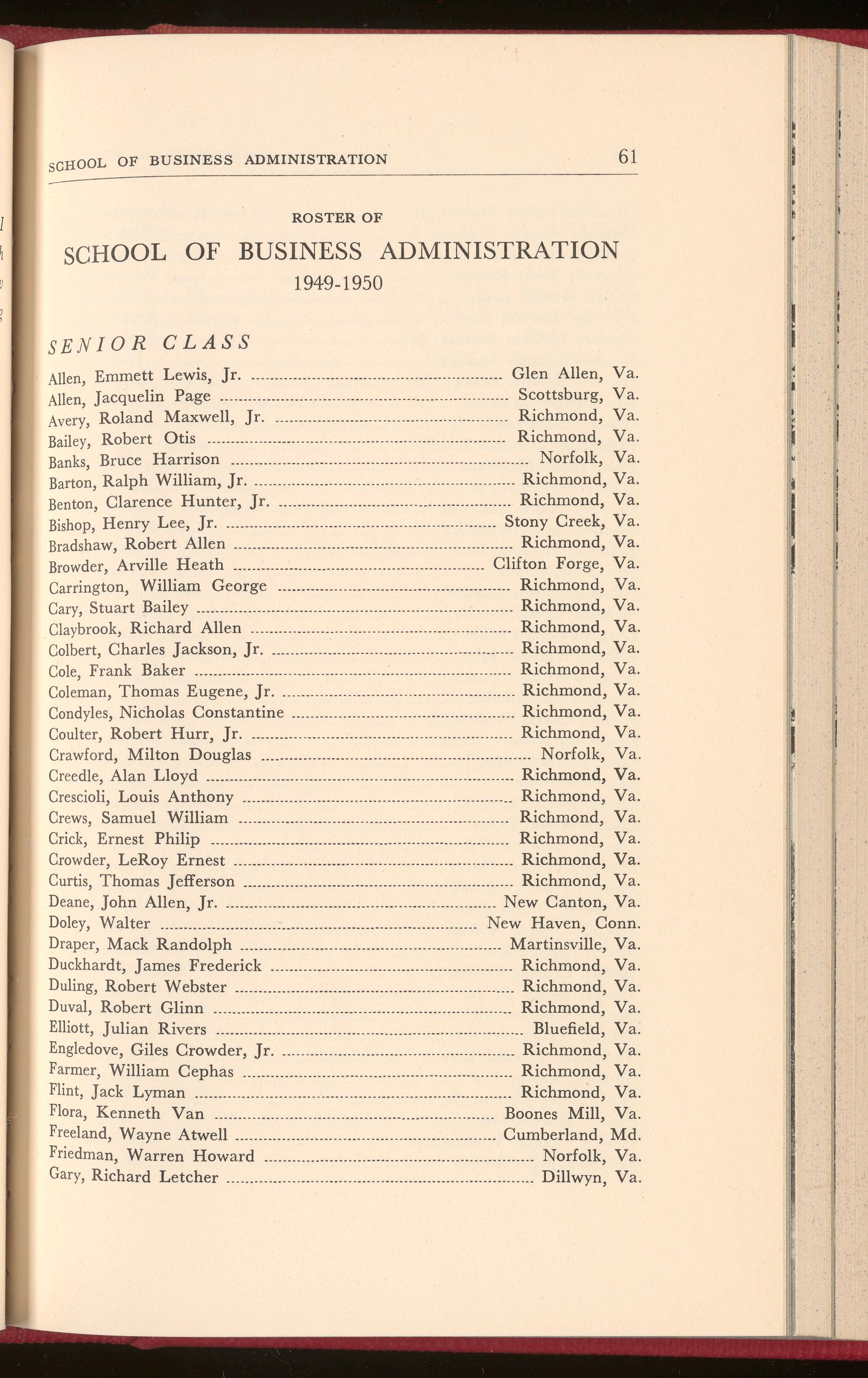
. Richmond, Va
Crowder, LeRoy Ernest ............................................................ Richmond, Va
Curtis, Thomas Jefferson .......................................................... Richmond, Va .
Deane, John Allen, Jr New Canton, Va
Doley, Walter .......
. New Haven, Conn Draper, Mack Randolph Martin svill e , Va. Duckhardt, J a m es Frederick ........ ....... Richmond, Va
Duling, Robert Webster ............................................................ Richmond, V a.
Duval, Robert Glinn .........................
.......... Richmond, Va
Elliott, Julian Rivers .................................................................. Bluefield, Va. Engledove, Giles Crowder, Jr .. .. .... . ..... Richmond, Va.
Farmer, William Cephas Richmond, Va. Flint, Jack Lyman Richmond, Va.
Flora, Kenneth Van ............................................................ Boones Mill, Va
Freeland, Wayne Atwell ................... ... .... . Cumberland, Md.
Friedman, Warren Howard Norfolk, V a.
Gary, Richard Letcher ..... ..
....... Dillwyn, Va
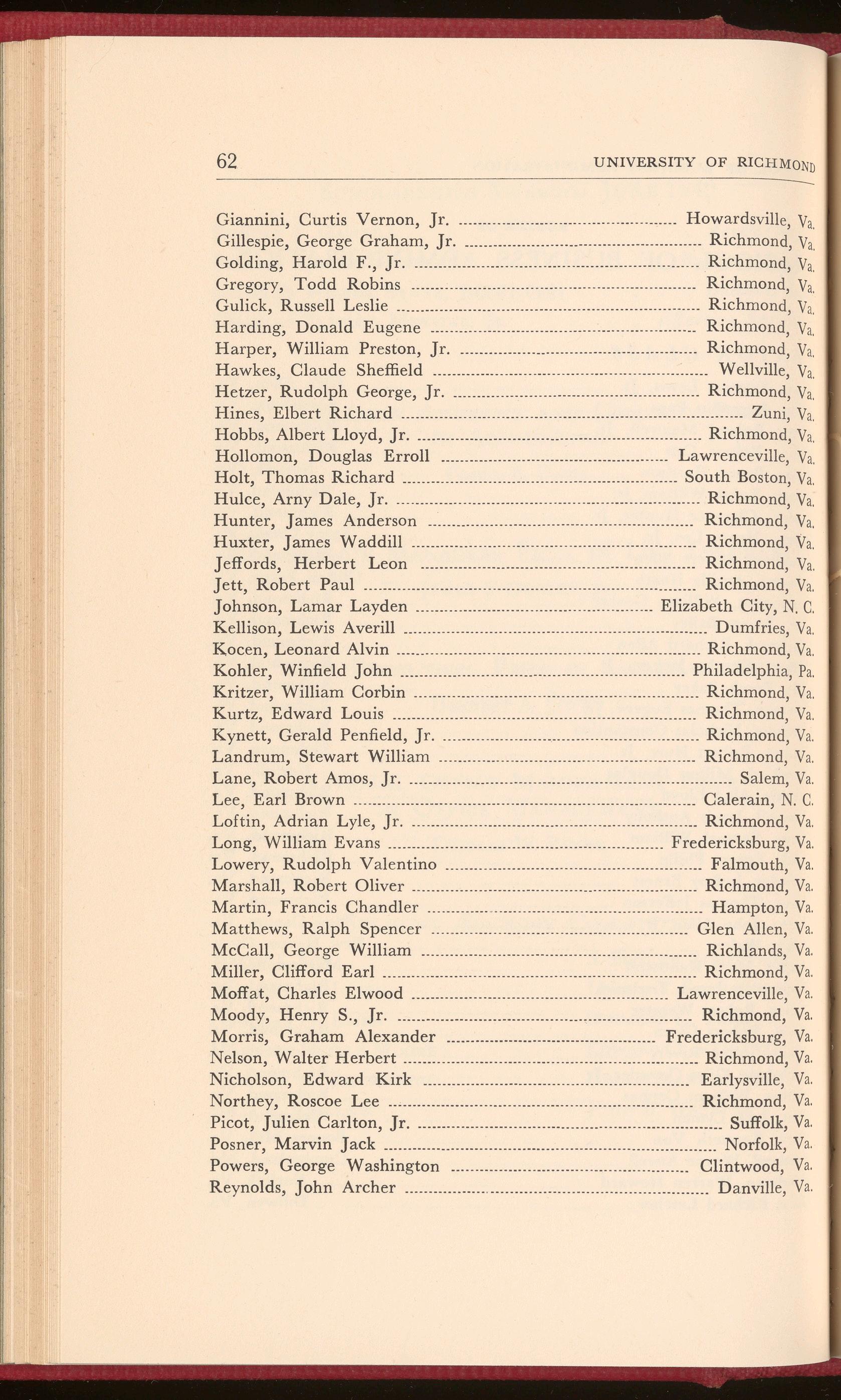
Giannini, Curtis Vernon, Jr ............................................... Howardsville, Va.
Gillespie, George Graham, Jr Richmond, Va.
Golding, Harold F., Jr. ............................................................ Richmond, Va.
Gregory, Todd Robins Richmond, Va.
Gulick, Russell Leslie Richmond, Va.
Harding, Donald Eugene ........................................................ Richmond, Va.
Harper, William Preston, Jr. .................................................. Richmond, Va.
Hawkes, Claude Sheffield .......................................................... Wellville, Va.
Hetzer, Rudolph George, Jr ..................................................... Richmond, Va.
Hines, Elbert Richard ........................................................................ Zuni, Va.
Hobbs, Albert Lloyd, Jr. ............................................................ Richmond, Va.
Hollomon, Douglas Erroll Lawrenceville, Va.
Holt, Thomas Richard ..................... .................................... South Boston, Va.
Hulce, Arny Dale, Jr. ................................................................ Richmond, Va.
Hunter, James Anderson Richmond, Va.
Huxter, James Waddill .................... ...................................... Richmond, Va.
Jeffords, Herbert Leon .......................................................... Richmond, Va.
Jett, Robert Paul ......................................................... ............ Richmond, Va.
Johnson, Lamar Layden Elizabeth City, N. C.
Kellison, Lewis Averill .......................................... .. .................... Dumfries, Va.
Kocen, Leonard Alvin ................................................................ Richmond, Va.
Kohler, Winfield John ............................................................ Philadelphia, Pa.
Kritzer, William Corbin ............................................ .............. Richmond, Va.
Kurtz, Edward Louis ................................................................ Richmond, Va.
Kynett, Gerald Penfield, Jr. Richmond, Va.
Landrum, Stewart William ............... ................. .... .................. Richmond, Va.
Lane, Robert Amos, Jr Salem, Va
Lee, Earl Brown ....................................... .................... Calerain, N. C.
Loftin, Adrian Lyle, Jr. ............................................................ Richmond, Va.
Long, William Evans .......................................................... Fredericksburg, Va.
Lowery, Rudolph Valentino ...................................................... Falmouth, Va.
Marshall, Robert Oliver ............................................................ Richmond, Va.
Martin, Francis Chandler ............. Hampton, Va.
Matthews, Ralph Spencer .... ...................................... .. .......... Glen Allen, Va.
McCall, George William .......................................................... Richlands, Va.
Miller, Clifford Earl ................................................... ............ Richmond, Va.
Moffat, Charles Elwood ...................................................... Lawrenceville, Va.
Moody, Henry S., Jr. Richmond, Va.
Morris, Graham Alexander ............................................ Fredericksburg, Va.
Nelson, Walter Herbert .............................................................. Richmond, Va.
Nicholson, Edward Kirk ........................................................ Earlysville, Va.
Northey, Roscoe Lee ................................................................ Richmond, Va.
Picot, Julien Carlton, Jr ................................................................. Suffolk, Va.
Posner, Marvin Jack ...................................................................... Norfolk, Va.
Powers, George Washington .................................................. Clintwood, Va.
Reynolds, John Archer ............................................... .. ............... Danville, Va.
Rhodenhiser, John Robert ........................... .... ......... Appalachia, Va
Rosen, Arthur Herbert .............................................................. Richmond, Va.
Roth, Donald William ... .... ........ ...... . ................. .... Newark, N. J.
Rowe, William Lees ................ .. .................................. Richmond, Va.
Schumann, Louis Albert, Jr ........................ .. .... .................. Richmond, Va .
Shahda, William George .......... .........
Smith, Bernar d H ........ .........

..... . Richmond, Va.
........................ .... .. Richmond, Va.
Stokes, Bernard Lee ......... .... ...................... .................. Front Royal, Va.
Str~der, Virgil R ea, Jr ................. .. ...... ...... .. Winchester, Va.
Sykes, Corne lius Winfree, Jr ... ............... .........
... . Richmond, Va.
Taylor, Howard Winston, Jr .. ........ ... .................................. Richmond, Va
Terry, George Abbitt ................... .................................. .............. Pamplin, Va.
Thornton, Julian Edward ...........
Tompkins, Henry Fitzhugh, Jr ..........
Vassar, Edward Moorefield ........... .....
. West Point, Va. .,
............................. Richmond, Va.
.. ........ Richmond, Va
Waid, Richard File ............................... ................. ... Raleigh, W. Va.
Walsh, Thomas King ....... .... ............ .............. ... Norfolk, Va.
Ward, Henry Beecher ........................................ ......... ........... Richmond, Va.
Warren, Robert Charles ................................... ............... Dahlgren, Va.
Weaver, Milford Anderson ...................... ... ........ Martinsville, Va.
Wells, Robert Scovel ............ ... ......................................... ...... Richmond, Va .
Welsh, Charles Bernard, Jr. .............................. .................. Harrisonburg, Va.
White, Harold Eugene ..... .. ........ .. ....................... .. ..... Covington, Va
Williams, David Oscar ........................ ......................... North Tazewell, Va.
Willingham, Harris E., Jr .......................... ................ Washington, D. C.
Wilson, Robert Addison, Jr. .......... .... ... ........ .... ..... ..... Richmond, Va.
Winters, Austin Henry ................ ................ ..... Richmond, Va.
Woodfin, Paul Beverly ... ................... .. .. .. .. .... .......... Roanoke, Va.
Worley, Earle Fr ederick .................. ....... ........ ..... ... ..... Hopewell, Va. Zambetis, Zack Zapp as ............................................................ Richmond, Va.
Alexander, Lawrence Gl en .................................... ....... Amelia, V a . Armstrong, Thomas Christian, Jr. ................. ....... ... ...... ..... Richmond, V a.
Bannister, William Cam er on, Jr ..................... . ....... Richmond, V a Booth, Glenn Baylor ... ........ ......... ....... ................ .. Victoria, Va.
Brooks, Joseph Edward ................................. .............................. Dundas, Va.
Brosky, Low ell Arthur ............................................................ Richmond, V a .
Brown, George Wilson .............................................................. Richmond, Va.
Browning, Philip Macy .... .. ............ ............... ... ... ....... Richmond, V a
Burton, Ashby Jeffries, Jr. ..... .... . .................................. Culpeper, Va.
Calfee, Milton Dudley .......................................................... Bluefield, W. Va.
Castros, Arthur Thom as .. ... ............ ............... ....... Roanoke, Va

UNIVERSITY OF RICHMO ND
Flannagan, Samuel Hensor, III ........... ... ... Louis a, Va. Fowlkes, Floyd Edward, Jr ...... ................... ... . ......... Richmond, Va. Grabeel, William Sims .............................................................. Rose Hill, Va. Graves, Edmond Ralph, Jr. .................................................... Richmond, Va. Gutzke, William Henry Norbert ........
Richmond, Va. Hallett, R eg inald Yartye Southcott ........................................ Richmond , Va. Harris, Edward Lee .......
. Richmond, Va. Harrison, Edward Mortim er, Jr. ....... ...
.................... Hopew ell, Va. Hastings, Harry ...... .. ... ... ....
Sylva, N. C. Hawkins, Warren Ross ............................................................ Richmond , Va. Hawks, Wilbur Thomas ...... .................... ..... Victori a, Va. Howell, James Simpson .... .
Richmond, Va. Hunt, Herbert .... ......
.... Charlotte, N. C, J ennings, William Rosser, Jr. .. ....
Richmond , Va. Johnson, Robert Ernest ..
Arlington, Va. LaFratta, Ramon Joseph ....
. Richmond , Va. Landi, Edward George .. .............
. Richmond , Va. Lawrence, James Harold, Jr. ............ ..................... Richmond , Va, Lawther, Robert James ........................................................ Coll ege Park, Ga. L ew is, Be njamin Franklin, Jr ............................................... Fount a in, N. C. Lilly, James David .................................................................. Richmond , Va, Locke, Bruce Whitmore ...
................................. Richmond, Va. Long, Garland L ee .................................................................. Richmond , Va. Loury, Keith All en ........
Louisville , Ohio Lovell, Harry Gratton .. ....
........................................ Beckley, W. Va, Mann, Robert A .... ............
...................... Richmond , Va, Marsland, Stuart J ame s ............. .................................... Northville, N. Y. Minter, Charles Eugene ..... .. .................... ................ M a rtin svill e, Va. Mock, Lewis Franklin . .... ............. Abingdon, Va. Morris, Thomas Omberton ....................... .. ........... Richmond , Va. Motto, K e nneth E ar l .................................................... .. Colonial H eights, Va. Neatrour, Charles Raymond ........................................................ Chester, Va. Newhouse, William Raymond ................. ........ ........... . Chicago, Ill. Nuckols, Murrell Abner ............................... . Richmond , Va. O'Brien, J a ckie Clarence .................. ... Victori a, Va. Parker, Forrest N a than ............. . ........................ Richmond , Va. P a ulette, Roy Baker ................................ .......... ..... ............ Appomattox, Va, Petrie, Frank Abbott ................................. .................. ,..... Shelby, Ohio Pittman, Albert Calhoun ............... . ............. W as h ingt on, D. C. Pollard, P ey ton Mason ..................... ......... .................. Petersburg, Va. Prillaman, William Harmon, Jr ..................................................... Bassett, Va. Ratliff, Earl G ..................................................... ...... ... ... ........ Port smo ut h, Va. Samuels , Jay Paul ..................................... .. .... . F ores t Hills, N Y. Saunders, Leo W a lter ..................... ... ..... ........ Richmond , Va. Sawyer, Willia m Donald ......... ................................ Greenbush, Va. Schmidt, L eo Tyler ................... ....................... ......... ... N orfolk, Va.
scHOOL OF BUSINESS ADMINISTRATION
Silver, Malcolm Irving
Spector, Gilbert Roland
Stephens, Robert Scott
Stuckey, Alva, Jr
Sturtridge, Dewey Clarence, Jr
Taylor, Bowlman Gray·
Taylor, Morrison Saunders
Terell, Francis Xavier
Thayer, Louis Ray
Vernon, Calvin Coolidge
Weaver, John Boyd
Weiman, Samuel
Whitlock, Edward Seaye rs, Jr
Wilson, Herbert Th eodore, Jr.
Wiltshire, Richard Arrington
Wolfe, William Henry, Jr.
Woodson, Clyde Eug
Wornom, Boyce Carmine
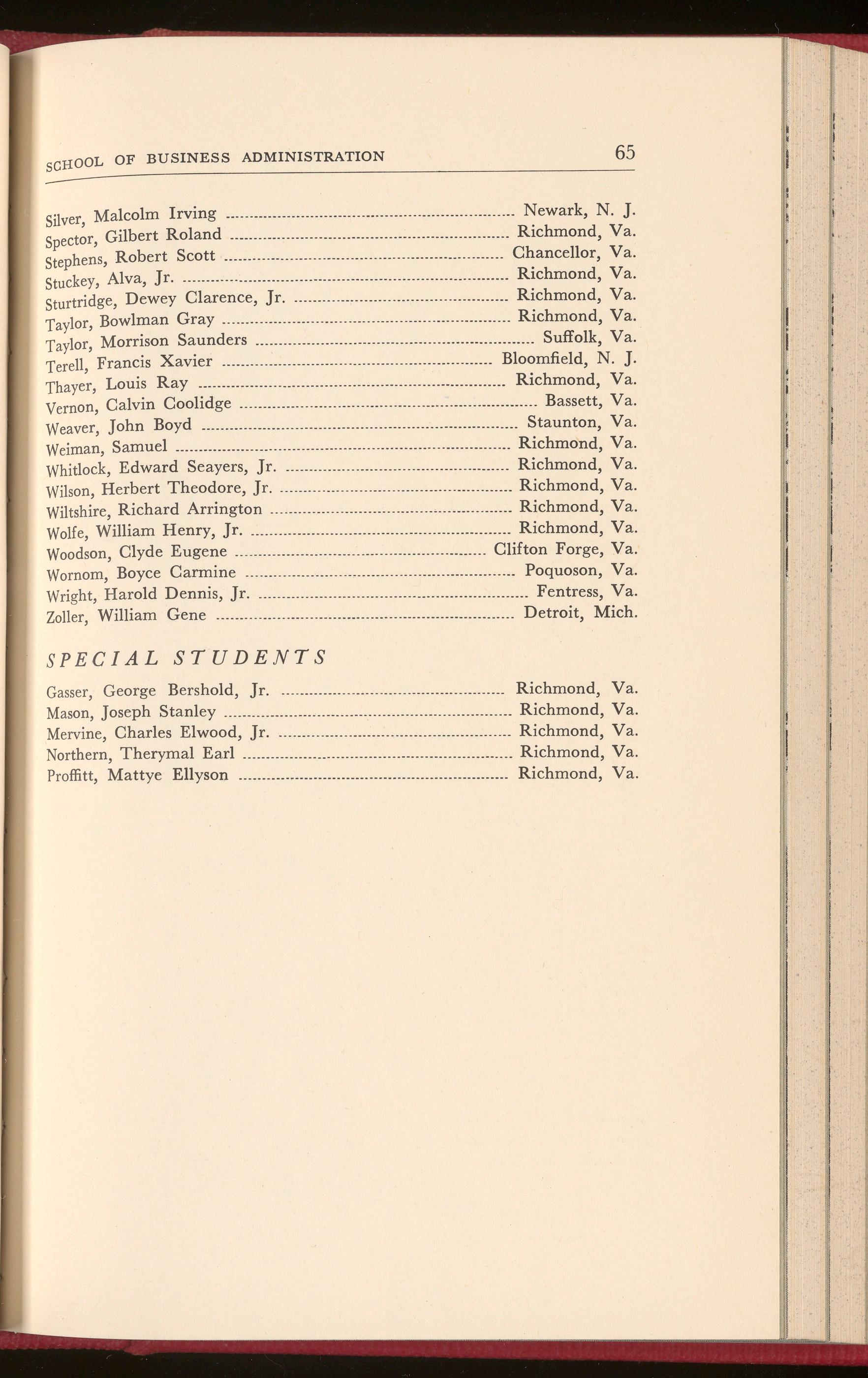
Newark, N J.
Richmond, Va.
Chancellor, Va.
Va.
Va.
Richmond, Va.
Suffolk, Va
N. J.
Richmond, Va.
Bassett, Va.
Staunton, Va
Va.
Va.
Richmond, Va
Va.
Va.
Clifton Forge, Va.
Va. Wright, Harold Dennis, Jr.
Zoller, William Gene
Gasser, George Bershold, Jr
Fentress, Va
Detroit, Mich
Va. Mason, Joseph St an ley
Richmond, Va Mervine, Charles Elwood, Jr.
Va. Northern, Therymal E arl
Va Proffitt, Mattye Ellyson
V a.


